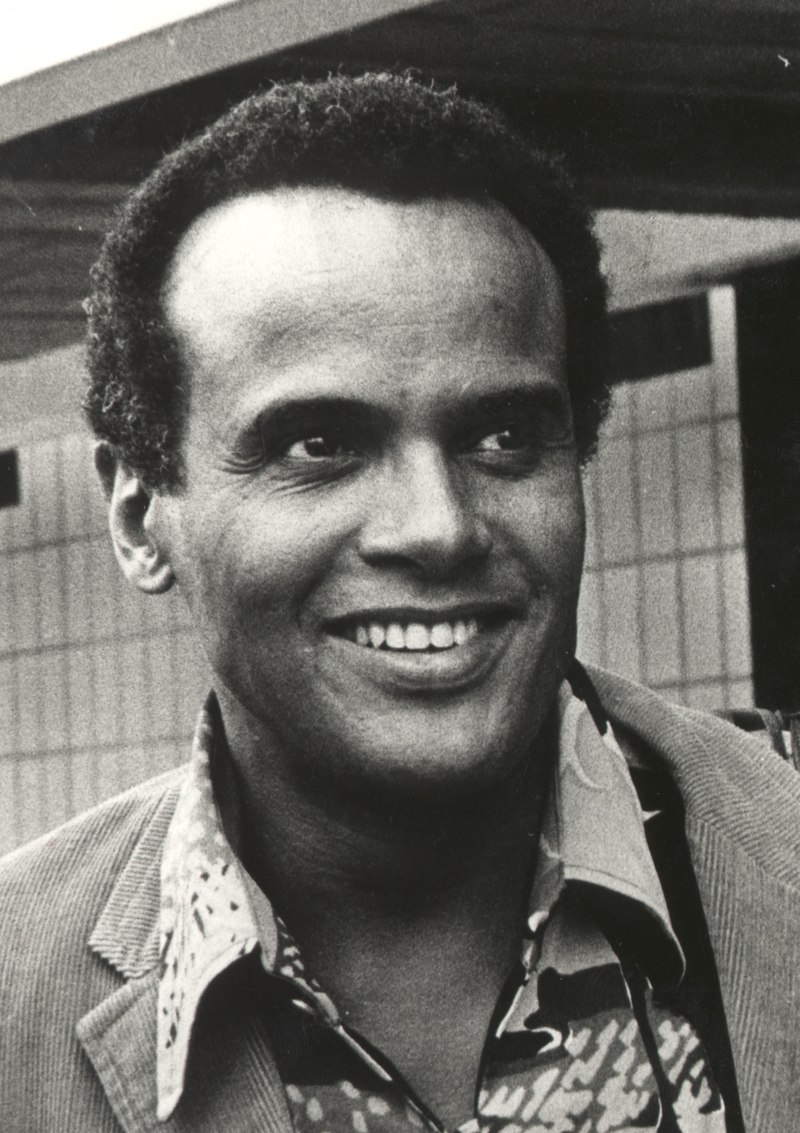
ハリー・ベラフォンテ
Harry Belafonte, 1927-2023

☆ ハリー・ベラフォンテ(Harry Belafonte、ハロルド・ジョージ・ベランファンティ・ジュニア、1927年3月1日 - 2023年4月25日)はアメリカの歌手、俳優、公民権運動家で、1950年代から1960年代にかけてカリプソ音楽を国際的な聴衆に広めた。ベラフォン テの出世作となったアルバム『カリプソ』(1956年)は、シングル・アーティストによる初のミリオンセラーLPとなった[1]。
| Harry Belafonte
(born Harold George Bellanfanti Jr.; March 1, 1927 – April 25, 2023)
was an American singer, actor, and civil rights activist, who
popularized calypso music with international audiences in the 1950s and
1960s. Belafonte's career breakthrough album Calypso (1956) was the
first million-selling LP by a single artist.[1] Belafonte was best known for his recordings of "Day-O (The Banana Boat Song)", "Jump in the Line (Shake, Senora)", "Jamaica Farewell", and "Mary's Boy Child". He recorded and performed in many genres, including blues, folk, gospel, show tunes, and American standards. He also starred in films such as Carmen Jones (1954), Island in the Sun (1957), Odds Against Tomorrow (1959), Buck and the Preacher (1972), and Uptown Saturday Night (1974). He made his final feature film appearance in Spike Lee's BlacKkKlansman (2018). Belafonte considered the actor, singer, and activist Paul Robeson to be a mentor. Belafonte was also a close confidant of Martin Luther King Jr. during the Civil Rights Movement of the 1950s and 1960s. He was a vocal critic of the policies of the George W. Bush and Donald Trump administrations. Belafonte acted as the American Civil Liberties Union celebrity ambassador for juvenile justice issues.[2] Belafonte won three Grammy Awards (including a Grammy Lifetime Achievement Award), an Emmy Award,[3] and a Tony Award. In 1989, he received the Kennedy Center Honors. He was awarded the National Medal of Arts in 1994. In 2014, he received the Jean Hersholt Humanitarian Award at the Academy's 6th Annual Governors Awards[4] and in 2022 was inducted into the Rock and Roll Hall of Fame in the Early Influence category.[5] He is one of the few performers to have received an Emmy, Grammy, Oscar, and Tony (EGOT), although he won the Oscar in a non-competitive category. |
ハ
リー・ベラフォンテ(Harry Belafonte、ハロルド・ジョージ・ベランファンティ・ジュニア、1927年3月1日 -
2023年4月25日)はアメリカの歌手、俳優、公民権運動家で、1950年代から1960年代にかけてカリプソ音楽を国際的な聴衆に広めた。ベラフォン
テの出世作となったアルバム『カリプソ』(1956年)は、シングル・アーティストによる初のミリオンセラーLPとなった[1]。 ベラフォンテは "Day-O (The Banana Boat Song)"、"Jump in the Line (Shake, Senora)"、"Jamaica Farewell"、"Mary's Boy Child "のレコーディングでよく知られている。ブルース、フォーク、ゴスペル、ショー・チューン、アメリカン・スタンダードなど、さまざまなジャンルをレコー ディングし、演奏した。カーメン・ジョーンズ』(1954年)、『アイランド・イン・ザ・サン』(1957年)、『オッズ・アゲインスト・トゥモロー』 (1959年)、『バックと伝道師』(1972年)、『アップタウン・サタデーナイト』(1974年)などの映画にも出演。スパイク・リー監督の 『BlacKkKlansman』(2018年)で最後の長編映画出演を果たした。 ベラフォンテは俳優、歌手、活動家のポール・ロベソンを師と仰いでいた。ベラフォンテはまた、1950年代から1960年代の公民権運動におけるマーティ ン・ルーサー・キング・ジュニアの側近でもあった。彼はジョージ・W・ブッシュ政権とドナルド・トランプ政権の政策を声高に批判した。ベラフォンテはアメ リカ自由人権協会(American Civil Liberties Union)の有名人大使として、少年司法問題に取り組んだ[2]。 ベラフォンテは3つのグラミー賞(グラミー賞生涯功労賞を含む)、エミー賞、トニー賞を受賞[3]。1989年にはケネディ・センター栄誉賞を受賞。 1994年にはナショナル・メダル・オブ・アーツを受賞。2014年にはアカデミーの第6回ガバナーズ・アワードでジーン・ハーショルト・ヒューマニタリ アン賞を受賞し[4]、2022年にはアーリーインフルエンス部門でロックの殿堂入りを果たした[5]。 |
| Early life Belafonte was born Harold George Bellanfanti Jr.[6] on March 1, 1927, at Lying-in Hospital in Harlem, New York, the son of Jamaican-born parents Harold George Bellanfanti Sr. (1900–1990), who worked as a chef, and Melvine Love (1906–1988), a housekeeper.[7][8][9] There are disputed claims of his father's place of birth, which is also stated as Martinique.[10] His mother was the child of a Scottish Jamaican mother and an Afro-Jamaican father, and his father was the child of an Afro-Jamaican mother and a Dutch-Jewish father of Sephardic Jewish descent. Harry Jr. was raised Catholic and attended parochial school at St. Charles Borromeo.[11] From 1932 to 1940, Belafonte lived with one of his grandmothers in her native country of Jamaica, where he attended Wolmer's Schools. Upon returning to New York City, he dropped out of George Washington High School,[12] after which he joined the U.S. Navy and served during World War II.[13][14] In the 1940s, he was working as a janitor's assistant when a tenant gave him, as a gratuity, two tickets to see the American Negro Theater. He fell in love with the art form and also befriended Sidney Poitier. The financially struggling pair regularly purchased a single seat to local plays, trading places in between acts, after informing the other about the progression of the play.[15] At the end of the 1940s, Belafonte took classes in acting at the Dramatic Workshop of The New School in New York City with the influential German director Erwin Piscator alongside Marlon Brando, Tony Curtis, Walter Matthau, Bea Arthur, and Poitier, while performing with the American Negro Theater.[16] He subsequently received a Tony Award for his participation in the Broadway revue John Murray Anderson's Almanac (1954).[17] He also starred in the 1955 Broadway revue 3 for Tonight with Gower Champion.[18] |
生い立ち ベラフォンテは1927年3月1日、ジャマイカ出身でシェフとして働いていたハロルド・ジョージ・ベランファンティ・シニア(1900-1990)と家政 婦のメルヴィーン・ラヴ(1906-1988)の息子として、ニューヨーク・ハーレムのライイング・イン・ホスピタルでハロルド・ジョージ・ベランファン ティ・ジュニア[6]として生まれた[7][8][9]。 母親はスコットランド系ジャマイカ人の母親とアフロ・ジャマイカ人の父親の間に生まれ、父親はアフロ・ジャマイカ人の母親とセファルディ系ユダヤ人のオラ ンダ系ユダヤ人の父親の間に生まれた。ハリー・ジュニアはカトリック教徒として育ち、セント・チャールズ・ボロメオの教区学校に通った[11]。 1932年から1940年まで、ベラフォンテは祖母の母国ジャマイカで祖母と暮らし、そこでウォルマースクールに通った。ニューヨークに戻ると、ジョー ジ・ワシントン高校を中退し[12]、その後アメリカ海軍に入隊して第二次世界大戦中に従軍した[13][14]。1940年代、清掃員の助手として働い ていた彼は、借家人からアメリカ黒人劇場の観劇チケット2枚を謝礼としてもらった。彼はその芸術に惚れ込み、シドニー・ポワチエとも親しくなった。経済的 に苦しい二人は、定期的に地元の演劇の一人席を購入し、芝居の進行状況を相手に知らせた後、幕間に場所を交換した[15]。 1940年代末、ベラフォンテはニューヨークのニュースクールのドラマティック・ワークショップで、マーロン・ブランド、トニー・カーティス、ウォル ター・マッソー、ベア・アーサー、ポワチエらとともに、影響力のあるドイツ人演出家エルヴィン・ピスカトールのもとで演技のクラスを受け、アメリカ黒人劇 場で公演を行った[16]。 |
Musical career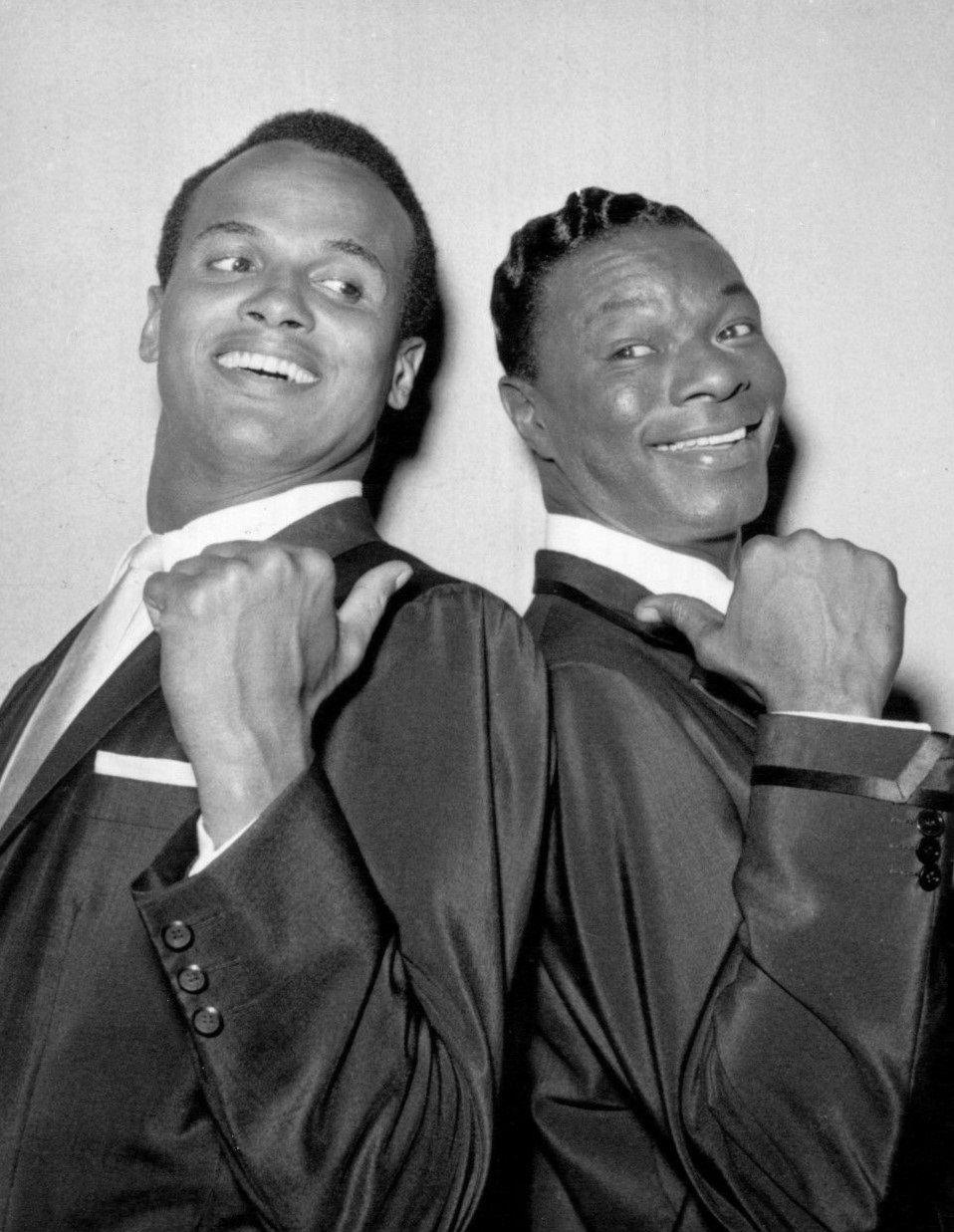 Belafonte with Nat King Cole in 1957 Early years (1949–1955) 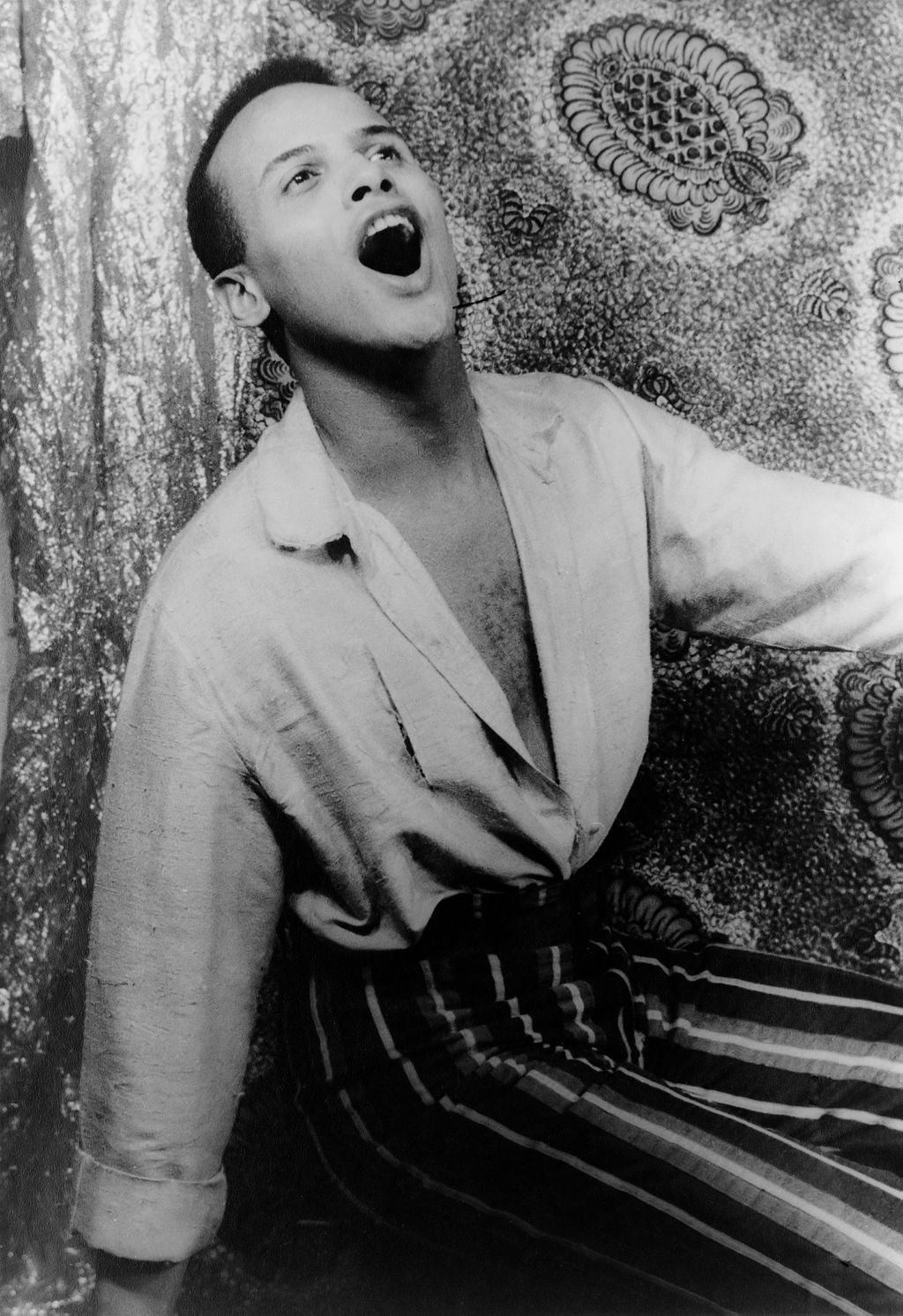 Harry Belafonte in John Murray Anderson's Almanac on Broadway, photographed by Carl Van Vechten, 1954 Belafonte started his career in music as a club singer in New York to pay for his acting classes.[19] The first time he appeared in front of an audience, he was backed by the Charlie Parker band, which included Charlie Parker himself, Max Roach, and Miles Davis, among others.[20] He launched his recording career as a pop singer on the Roost label in 1949, but quickly developed a keen interest in folk music, learning material through the Library of Congress' American folk songs archives. With guitarist and friend Millard Thomas, Belafonte soon made his debut at the legendary jazz club The Village Vanguard.[21] He signed a contract with RCA Victor in 1953, recording regularly for the label until 1974.[22] Belafonte also performed during the Rat Pack era in Las Vegas.[23] Belafonte's first widely released single, which went on to become his "signature" audience participation song in virtually all his live performances, was "Matilda", recorded April 27, 1953.[22]Between 1953–1954, he was a cast member of the Broadway musical revue and sketch comedy show John Murray Anderson's Almanac where he sang Mark Twain,[24] of which Harry Belafonte was the songwriter. An example of the lyrics from this song can give a sense of what it may have been like to be in the audience of such a show with Harry Belafonte singing this song: It was a floatin' palace, boy, that showboat called The Stage, and granddad was the king of it when he was just my age Mark Twain, it's two fathoms deep below. Mark Twain, heave the gang plank. Start the show. Mark Twain, play those banjos as we go down the Mississippi, 'round the Gulf of Mexico.[25] Rise to fame (1956–1958) Belafonte's breakthrough album Calypso (1956) became the first LP in the world to sell more than one million copies in a year.[26] He stated that it was the first million-selling album ever in England. The album is number four on Billboard's "Top 100 Album" list for having spent thirty-one weeks at number 1, fifty-eight weeks in the top ten, and ninety-nine weeks on the U.S. chart.[27] The album introduced American audiences to calypso music (which had originated in Trinidad and Tobago in the early 19th century), and Belafonte was dubbed the "King of Calypso", a title he wore with reservations since he had no claims to any Calypso Monarch titles.[28] One of the songs included in the album is the now famous "Banana Boat Song" (listed as "Day-O" on the Calypso LP), which reached number five on the pop chart, and featured its signature lyric "Day-O".[29] Many of the compositions recorded for Calypso, including "Banana Boat Song" and "Jamaica Farewell", gave songwriting credit to Irving Burgie.[30] Middle career (1959–1970) 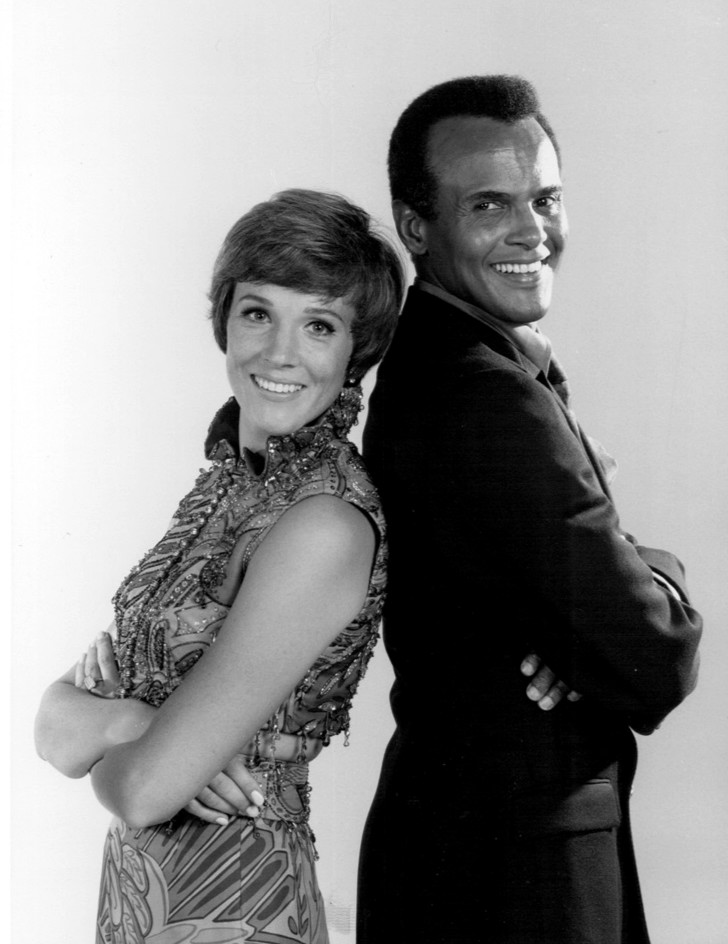 With Julie Andrews on the NBC special An Evening with Julie Andrews and Harry Belafonte (1969) While primarily known for calypso, Belafonte recorded in many different genres, including blues, folk, gospel, show tunes, and American standards. His second-most popular hit, which came immediately after "The Banana Boat Song", was the comedic tune "Mama Look at Bubu", also known as "Mama Look a Boo-Boo" (originally recorded by Lord Melody in 1955[31]), in which he sings humorously about misbehaving and disrespectful children. It reached number eleven on the pop chart.[32] In 1959, Belafonte starred in Tonight With Belafonte, a nationally televised special that featured Odetta, who sang "Water Boy" and who performed a duet with Belafonte of "There's a Hole in My Bucket" that hit the national charts in 1961.[33] Belafonte was the first Jamaican American to win an Emmy, for Revlon Revue: Tonight with Belafonte (1959).[3] Two live albums, both recorded at Carnegie Hall in 1959 and 1960, enjoyed critical and commercial success. From his 1959 album, "Hava Nagila" became part of his regular routine and one of his signature songs.[34] He was one of many entertainers recruited by Frank Sinatra to perform at the inaugural gala of President John F. Kennedy in 1961, which included Ella Fitzgerald, Mahalia Jackson, and others.[35] Later that year, RCA Victor released another calypso album, Jump Up Calypso, which went on to become another million seller. During the 1960s he introduced several artists to U.S. audiences, most notably South African singer Miriam Makeba and Greek singer Nana Mouskouri. His album Midnight Special (1962) included a young harmonica player named Bob Dylan.[36] As the Beatles and other stars from Britain began to dominate the U.S. pop charts, Belafonte's commercial success diminished; 1964's Belafonte at The Greek Theatre was his last album to appear in Billboard's Top 40. His last hit single, "A Strange Song", was released in 1967 and peaked at number 5 on the adult contemporary music charts. Belafonte received Grammy Awards for the albums Swing Dat Hammer (1960) and An Evening with Belafonte/Makeba (1965). The latter album dealt with the political plight of black South Africans under apartheid. He earned six Gold Records.[37] During the 1960s, Belafonte appeared on TV specials alongside such artists as Julie Andrews, Petula Clark, Lena Horne, and Nana Mouskouri. In 1967, Belafonte was the first non-classical artist to perform at the prestigious Saratoga Performing Arts Center (SPAC) in Upstate New York,[38] soon to be followed by concerts there by the Doors, the 5th Dimension, the Who, and Janis Joplin. From February 5 to 9, 1968, Belafonte guest hosted The Tonight Show substituting for Johnny Carson.[39] Among his interview guests were Martin Luther King Jr. and Senator Robert F. Kennedy.[39][40] Later recordings and subsequent activities (1971–2023) Belafonte's fifth and final calypso album, Calypso Carnival, was issued by RCA in 1971.[41] Belafonte's recording activity slowed considerably after releasing his final album for RCA in 1974. From the mid-1970s to early 1980s, Belafonte spent the greater part of his time on tour, which included concerts in Japan, Europe, and Cuba.[42] In 1977, Columbia Records released the album Turn the World Around, with a strong focus on world music.[43] In 1978 he was a guest star on an episode of The Muppet Show, on which he performed his signature song "Day-O".[44] However, the episode is best known for Belafonte's rendition of the spiritual song "Turn the World Around", from the album of the same name, which he performed with specially made Muppets that resembled African tribal masks.[45][46] It became one of the series' most famous performances and was reportedly Jim Henson's favorite episode. After Henson's death in May 1990, Belafonte was asked to perform the song at Henson's memorial service.[46][47] "Turn the World Around" was also included in the 2005 official hymnal supplement of the Unitarian Universalist Association, Singing the Journey.[48] From 1979 to 1989, Belafonte served on the Royal Winnipeg Ballet's board of directors.[49] 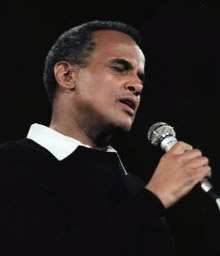 Belafonte performing in 1983 Belafonte released his first album of original material in over a decade, Paradise in Gazankulu, in 1988, and contained ten protest songs against the South African former Apartheid policy, and was his last studio album.[50] In the same year Belafonte, as UNICEF Goodwill Ambassador, attended a symposium in Harare, Zimbabwe, to focus attention on child survival and development in Southern African countries. As part of the symposium, he performed a concert for UNICEF. A Kodak video crew filmed the concert, which was released as a 60-minute concert video titled "Global Carnival".[51] Following a lengthy recording hiatus, An Evening with Harry Belafonte and Friends, a soundtrack and video of a televised concert, were released in 1997 by Island Records.[52] The Long Road to Freedom: An Anthology of Black Music, a huge multi-artist project recorded by RCA during the 1960s and 1970s, was finally released by the label in 2001. Belafonte went on the Today Show to promote the album on September 11, 2001, and was interviewed by Katie Couric just minutes before the first plane hit the World Trade Center.[53] The album was nominated for the 2002 Grammy Awards for Best Boxed Recording Package, for Best Album Notes, and for Best Historical Album.[54] 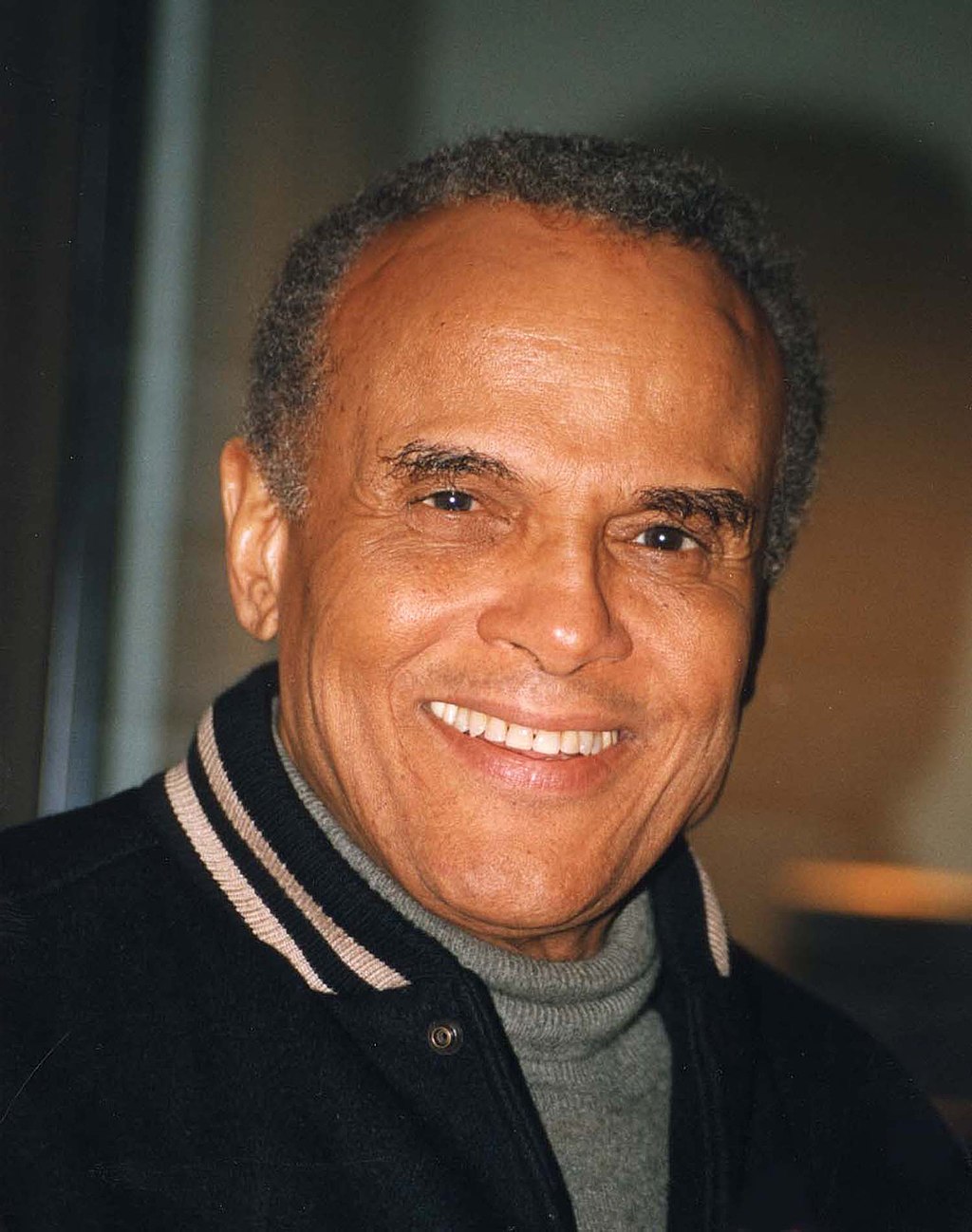 Belafonte in 1996 Belafonte received the Kennedy Center Honors in 1989.[55] He was awarded the National Medal of Arts in 1994 and he won a Grammy Lifetime Achievement Award in 2000. He performed sold-out concerts globally through the 1950s to the 2000s. His last concert was a benefit concert for the Atlanta Opera on October 25, 2003. In a 2007 interview, he stated that he had since retired from performing.[56] On January 29, 2013, Belafonte was the Keynote Speaker and 2013 Honoree for the MLK Celebration Series at the Rhode Island School of Design. Belafonte used his career and experiences with Dr. King to speak on the role of artists as activists.[57] Belafonte was inducted as an honorary member of Phi Beta Sigma fraternity on January 11, 2014.[58] In March 2014, Belafonte was awarded an honorary doctorate from Berklee College of Music in Boston.[59] In 2017, Belafonte released When Colors Come Together, an anthology of some of Belafonte's earlier recordings produced by his son David who wrote lyrics for an updated version of "Island In The Sun", arranged by longtime Belafonte musical director Richard Cummings, and featuring Harry Belafonte's grandchildren Sarafina and Amadeus and a children's choir.[60] |
音楽活動 1957年、ナット・キング・コールと共演したベラフォンテ 初期(1949年~1955年)  ジョン・マレー・アンダーソンの『アルマナック・オン・ブロードウェイ』に出演したハリー・ベラフォンテ(カール・ヴァン・ヴェヒテン撮影、1954年 ベラフォンテは俳優養成所の学費を稼ぐため、ニューヨークのクラブ・シンガーとして音楽のキャリアをスタートさせた[19]。 彼が初めて観客の前に姿を現したとき、チャーリー・パーカー楽団(チャーリー・パーカー本人、マックス・ローチ、マイルス・デイヴィスらが参加)のバック を務めた[20]。 1949年、ルースト・レーベルからポップ・シンガーとしてレコーディング・キャリアをスタートさせたが、すぐにフォーク・ミュージックに強い関心を抱く ようになり、米国議会図書館のアメリカ民謡アーカイブから素材を学んだ。1953年にRCAビクターと契約し、1974年まで同レーベルで定期的にレコー ディングを行った[22]。 [1953年から1954年にかけて、彼はブロードウェイのミュージカル・レヴューとスケッチ・コメディ・ショー『John Murray Anderson's Almanac』のキャスト・メンバーとして、ハリー・ベラフォンテがソングライターを務めた『Mark Twain』を歌った[24]。ハリー・ベラフォンテがこの曲を歌う、そのようなショーの観客がどのようなものであったかを、この曲の歌詞の一例から知る ことができる: ステージと呼ばれたショーボートは、浮遊する宮殿だった。 マーク・トウェイン、それは2ヒロ下の深さだ。マーク・トウェイン 桟橋を降ろせ ショーを始めろ マーク・トウェイン、バンジョーを弾きながらミシシッピ川を下り、メキシコ湾を一周するんだ[25]。 名声への上昇(1956年-1958年) ベラフォンテのブレイクのきっかけとなったアルバム『カリプソ』(1956年)は、1年間で100万枚以上を売り上げた世界初のLPとなった[26]。 彼はこのアルバムがイギリスで史上初のミリオンセラーを記録したアルバムだと述べている。このアルバムは、ビルボードの "トップ100アルバム "リストの4位で、31週間1位、58週間トップ10入り、そして99週間全米チャート入りした[27]。このアルバムは、アメリカの聴衆にカリプソ・ ミュージック(19世紀初頭にトリニダード・トバゴで生まれた)を紹介し、ベラフォンテは "カリプソの王 "と呼ばれたが、彼はカリプソ・モナークの称号を主張していなかったため、この称号を遠慮がちに身につけた[28]。 このアルバムに収録された曲の1つは、ポップ・チャートで5位を記録し、「Day-O」という特徴的 な歌詞をフィーチャーした、今では有名な「Banana Boat Song」(カリプソLPでは 「Day-O」と表記)である[29]。 Banana Boat Song "や "Jamaica Farewell "など、カリプソのためにレコーディングされた楽曲の多くは、アーヴィング・バージーの作詞作曲のクレジットがある[30]。 キャリア中期(1959-1970)  ジュリー・アンドリュースと共演したNBCのスペシャル番組『An Evening with Julie Andrews and Harry Belafonte』(1969年) 主にカリプソで知られるベラフォンテだが、ブルース、フォーク、ゴスペル、ショー・チューン、アメリカン・スタンダードなど、さまざまなジャンルでレコー ディングを行った。バナナ・ボート・ソング」の次にヒットしたのは、「ママ・ルック・ア・ブーブー」(原曲は1955年にロード・メロディが録音 [31])とも呼ばれるコミカルな曲で、行儀が悪く無礼な子供たちをユーモラスに歌っている。この曲はポップチャートで11位を記録した[32]。 1959年、ベラフォンテは『Tonight With Belafonte』という全国放送のスペシャル番組に出演し、オデッタをフィーチャーした。オデッタは「Water Boy」を歌い、ベラフォンテとデュエットした「There's a Hole in My Bucket」は1961年に全米チャートを賑わせた[33]: 1959年と1960年にカーネギー・ホールで録音された2枚のライブ・アルバムは、批評的にも商業的にも成功を収めた。1961年、ジョン・F・ケネ ディ大統領の就任式で、フランク・シナトラにスカウトされ、エラ・フィッツジェラルド、マヘリア・ジャクソンなど多くのエンターテイナーが出演した [35]。1960年代、彼は何人かのアーティストを米国の聴衆に紹介し、特に南アフリカ出身のシンガー、ミリアム・マケバとギリシャ出身のシンガー、ナ ナ・ムスクーリを紹介した。彼のアルバム『Midnight Special』(1962年)には、ボブ・ディランという若いハーモニカ奏者が参加している[36]。 ビートルズをはじめとするイギリスのスターたちがアメリカのポップチャートを席巻し始めると、ベラフォンテの商業的成功は減少し、1964年の 『Belafonte at The Greek Theatre』がビルボードのトップ40にランクインした最後のアルバムとなった。彼の最後のヒットシングル「A Strange Song」は1967年にリリースされ、アダルト・コンテンポラリー・ミュージック・チャートで5位を記録した。ベラフォンテはアルバム『Swing Dat Hammer』(1960年)と『An Evening with Belafonte/Makeba』(1965年)でグラミー賞を受賞。後者はアパルトヘイト下の南アフリカの黒人の政治的苦境を扱ったアルバムである。 彼は6つのゴールドレコードを獲得した[37]。 1960年代、ベラフォンテはジュリー・アンドリュース、ペトゥラ・クラーク、レナ・ホーン、ナナ・ムスクーリなどのアーティストと共にテレビのスペシャ ル番組に出演した。1967年、ベラフォンテはニューヨーク州北部の名門サラトガ・パフォーミング・アーツ・センター(SPAC)で、クラシック以外の アーティストとして初めてコンサートを行った[38]。 1968年2月5日から9日にかけて、ベラフォンテはジョニー・カーソンの代役として『トゥナイト・ショー』のゲスト司会を務めた[39]。 その後のレコーディングと活動(1971年~2023年) ベラフォンテの5枚目にして最後のカリプソ・アルバム『Calypso Carnival』は1971年にRCAからリリースされた[41]。1974年にRCAから最後のアルバムをリリースした後、ベラフォンテのレコーディ ング活動はかなり鈍化した。1970年代半ばから1980年代初頭にかけて、ベラフォンテは日本、ヨーロッパ、キューバでのコンサートを含むツアーに多く の時間を費やした[42]。1977年、コロムビア・レコードはワールド・ミュージックに焦点を当てたアルバム『Turn the World Around』をリリースした[43]。 1978年、彼は『The Muppet Show』のエピソードにゲスト出演し、代表曲「Day-O」を披露した[44]。しかし、このエピソードは、ベラフォンテが同名のアルバムに収録されて いるスピリチュアル・ソング「Turn the World Around」を、アフリカの部族のマスクを模した特製のマペットと共に演奏したことで最もよく知られている[45][46]。このエピソードはシリーズ で最も有名なパフォーマンスのひとつとなり、ジム・ヘンソンのお気に入りのエピソードだったと言われている。1990年5月のヘンソンの死後、ベラフォン テはヘンソンの追悼式でこの曲を演奏するよう依頼された[46][47]。"Turn the World Around "はまた、ユニテリアンユニバーサリスト協会の2005年の公式賛美歌付録『Singing the Journey』にも収録された[48]。 1979年から1989年まで、ベラフォンテはロイヤル・ウィニペグ・バレエ団の理事を務めた[49]。  1983年にパフォーマンスするベラフォンテ 1988年、ベラフォンテは10年以上ぶりとなるオリジナル・アルバム『Paradise in Gazankulu』をリリース。このアルバムには、南アフリカの旧アパルトヘイト政策に対する10曲のプロテスト・ソングが収録されており、これが彼の 最後のスタジオ・アルバムとなった[50]。シンポジウムの一環として、彼はユニセフのためにコンサートを行った。コダックのビデオ・クルーがこのコン サートを撮影し、「Global Carnival」と題された60分のコンサート・ビデオとしてリリースされた[51]。 長いレコーディング休止期間を経て、1997年にアイランド・レコードから、テレビ放映されたコンサートのサウンドトラックとビデオを収録した『An Evening with Harry Belafonte and Friends』がリリースされた[52]: 1960年代から1970年代にかけてRCAが録音したマルチアーティストによる巨大プロジェクト『An Anthology of Black Music』が、2001年にようやく同レーベルからリリースされた。ベラフォンテは2001年9月11日、このアルバムのプロモーションのために『トゥ デイ・ショー』に出演し、最初の飛行機が世界貿易センターに衝突する数分前にケイティ・クーリックのインタビューを受けた[53]。このアルバムは 2002年度グラミー賞の最優秀ボックス・レコーディング・パッケージ賞、最優秀アルバム・ノート賞、最優秀ヒストリカル・アルバム賞にノミネートされた [54]。  1996年のベラフォンテ 1989年にケネディ・センター名誉賞を受賞[55]。1994年にはナショナル・メダル・オブ・アーツを受賞し、2000年にはグラミー賞生涯功労賞を 受賞。1950年代から2000年代にかけて、世界各地でソールドアウトのコンサートを開催。最後のコンサートは、2003年10月25日のアトランタ・ オペラのためのベネフィット・コンサートだった。2007年のインタビューでは、それ以降は演奏活動から引退したと述べている[56]。 2013年1月29日、ベラフォンテはロードアイランド・スクール・オブ・デザインで開催されたMLKセレブレーション・シリーズの基調講演者と2013 年のオノレを務めた。ベラフォンテは自身のキャリアとキング牧師との体験をもとに、活動家としてのアーティストの役割について語った[57]。 2014年1月11日、ベラフォンテはファイ・ベータ・シグマ友愛会の名誉会員に入会した[58]。 2014年3月、ベラフォンテはボストンのバークリー音楽大学から名誉博士号を授与された[59]。 2017年、ベラフォンテは、長年のベラフォンテの音楽監督であるリチャード・カミングスが編曲し、ハリー・ベラフォンテの孫であるサラフィーナとアマデ ウス、そして子供たちの合唱団をフィーチャーした「Island In The Sun」のアップデート・バージョンの歌詞を書いた息子デヴィッドがプロデュースした、ベラフォンテの初期のレコーディングのアンソロジー『When Colors Come Together』をリリースした[60]。 |
| Film career Early film career (1953–1956) 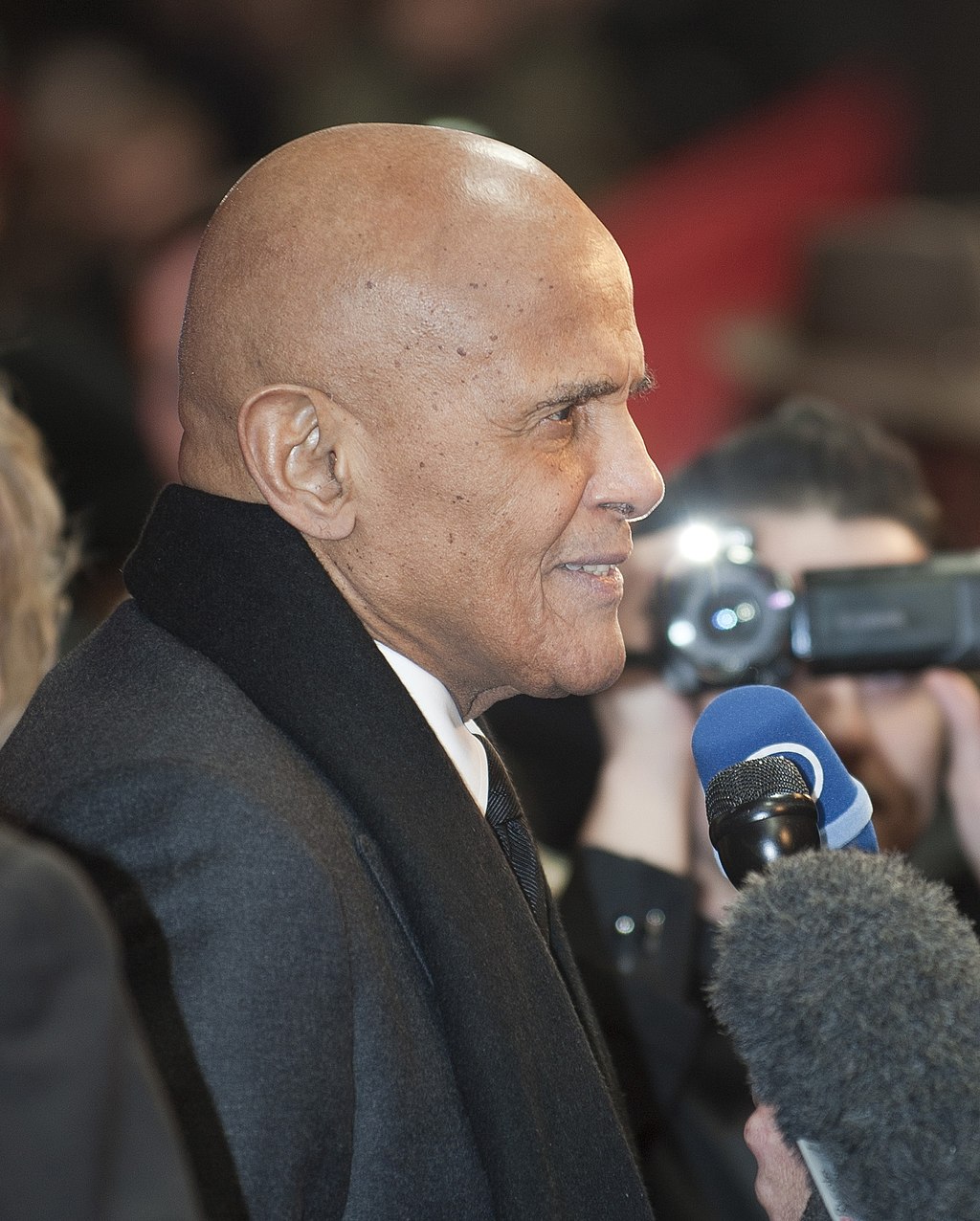 Belafonte at the 2011 Berlin Film Festival Belafonte starred in numerous films. His first film role was in Bright Road (1953), in which he supported female lead Dorothy Dandridge.[61] The two subsequently starred in Otto Preminger's hit musical Carmen Jones (1954). Ironically, Belafonte's singing in the film was dubbed by an opera singer, as was Dandridge's, both voices being deemed unsuitable for their roles.[16][61] Rise as an actor (1957–1959) Realizing his own star-power, Belafonte was subsequently able to land several (then) controversial film roles. In Island in the Sun (1957), there are hints of an affair between Belafonte's character and the character played by Joan Fontaine;[62] The film also starred James Mason, Dandridge, Joan Collins, Michael Rennie, and John Justin. In 1959, he starred in and produced (through his company HarBel Productions) Robert Wise's Odds Against Tomorrow, in which he plays a bank robber uncomfortably teamed with a racist partner (Robert Ryan). He also co-starred with Inger Stevens in The World, the Flesh and the Devil.[63] Belafonte was offered the role of Porgy in Preminger's Porgy and Bess, where he would have once again starred opposite Dandridge, but refused the role because he objected to its racial stereotyping; Sidney Poitier played the role instead.[64][65] Later film and theatre involvement (1960–2018) 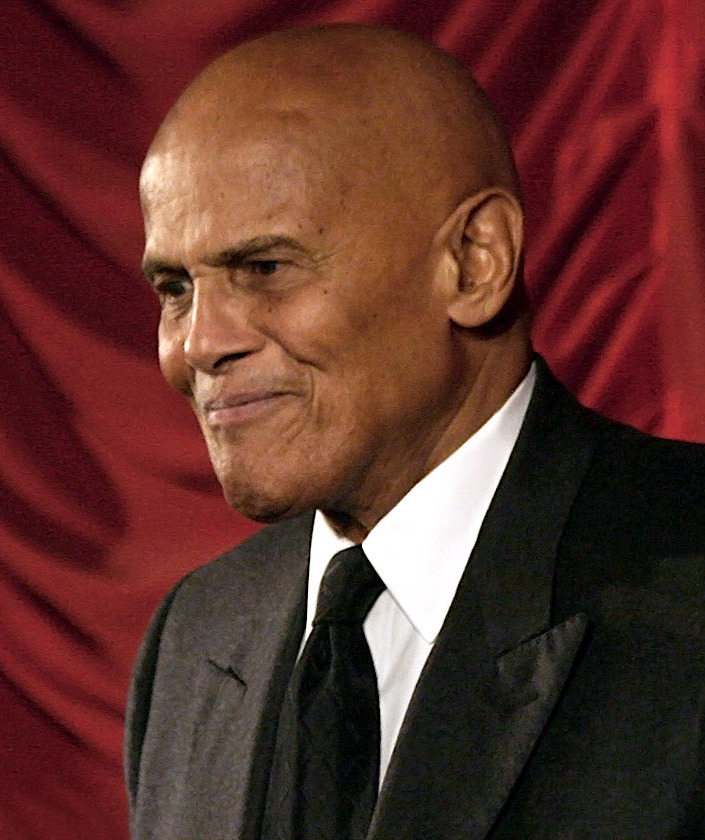 Belafonte at the 2011 Viennale Dissatisfied with most of the film roles offered to him during the 1960s, Belafonte concentrated on music. In the early 1970s, Belafonte appeared in more films, among which are two with Poitier: Buck and the Preacher (1972) and Uptown Saturday Night (1974).[66] In 1984, Belafonte produced and scored the musical film Beat Street, dealing with the rise of hip-hop culture.[67] Together with Arthur Baker, he produced the gold-certified soundtrack of the same name.[68] Belafonte next starred in a major film in the mid-1990s, appearing with John Travolta in the race-reverse drama White Man's Burden (1995);[69] and in Robert Altman's jazz age drama Kansas City (1996), the latter of which garnered him the New York Film Critics Circle Award for Best Supporting Actor.[70] He also starred as an Associate Justice of the Supreme Court of the United States in the TV drama Swing Vote (1999).[69] In 2006, Belafonte appeared in Bobby, Emilio Estevez's ensemble drama about the assassination of Robert F. Kennedy; he played Nelson, a friend of an employee of the Ambassador Hotel (Anthony Hopkins).[66] His final film appearance was in Spike Lee's Academy Award-winning BlacKkKlansman (2018) as an elderly civil rights pioneer.[10] |
映画キャリア 初期の映画キャリア(1953年~1956年)  2011年ベルリン映画祭でのベラフォンテ ベラフォンテは数多くの映画に出演した。最初の映画出演は『ブライト・ロード』(1953)で、主役のドロシー・ダンドリッジを支えた[61]。その後、 2人はオットー・プレミンジャー監督の大ヒットミュージカル『カルメン・ジョーンズ』(1954)で共演。皮肉なことに、この映画でのベラフォンテの歌声 はオペラ歌手による吹き替えで、ダンドリッジの歌声もそうであった。 俳優としての出世(1957年~1959年) 自身のスター性を自覚したベラフォンテは、その後、(当時は)物議を醸したいくつかの映画出演を果たすことができた。アイランド・イン・ザ・サン』 (1957年)では、ベラフォンテの役柄とジョーン・フォンテインの演じる役柄の間に不倫の気配があった。1959年、ロバート・ワイズ監督の『Odds Against Tomorrow(原題)』に主演し、(自身の会社HarBel Productionsを通じて)プロデュースした。また、『世界と肉と悪魔』ではインガー・スティーヴンスと共演。[63] ベラフォンテはプレミンジャー監督の『ポーギーとベス』のポーギー役をオファーされ、そこで再びダンドリッジと共演するはずだったが、人種的ステレオタイ プに反対したため、その役を断った。 その後の映画と演劇への参加(1960年~2018年)  2011年ウィーン国際映画祭でのベラフォンテ 1960年代にオファーされた映画出演のほとんどに不満だったベラフォンテは、音楽に集中した。1984年、ベラフォンテはヒップホップ・カルチャーの台 頭を扱ったミュージカル映画『ビート・ストリート』の製作と音楽を担当した[67]。 [1990年代半ばには、ジョン・トラボルタと共に人種逆転ドラマ『White Man's Burden』(1995年)、ロバート・アルトマン監督のジャズ・エイジドラマ『Kansas City』(1996年)に出演し、後者ではニューヨーク映画批評家協会賞の助演男優賞を受賞した[70]。 [70]また、テレビドラマ『Swing Vote』(1999年)では、合衆国最高裁判所の准判事役で出演した[69]。2006年、ベラフォンテは、ロバート・F・ケネディの暗殺を描いたエミ リオ・エステベス監督の群像劇『Bobby』に出演。最後の映画出演は、スパイク・リー監督のアカデミー賞受賞作『BlacKkKlansman』 (2018年)で、高齢の公民権運動の先駆者を演じた[10]。 |
Political and humanitarian
activism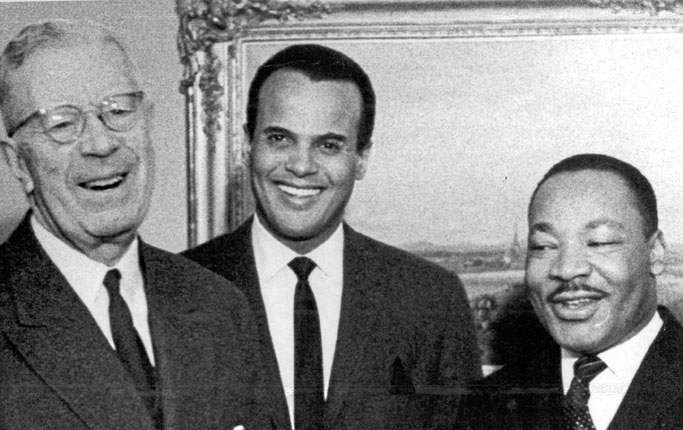 Belafonte with King Gustav VI Adolf and Martin Luther King Jr. in 1966 Belafonte is said to have married politics and pop culture.[71] Belafonte's political beliefs were greatly inspired by the singer, actor, and civil rights activist Paul Robeson, who mentored him.[72] Robeson opposed not only racial prejudice in the United States but also western colonialism in Africa. Belafonte refused to perform in the American South from 1954 until 1961.[73] In 1960, Belafonte appeared in a campaign commercial for Democratic Presidential candidate John F. Kennedy.[74] Kennedy later named Belafonte cultural advisor to the Peace Corps. Belafonte supported Lyndon B. Johnson for the 1964 United States presidential election.[75] Belafonte gave the keynote address at the ACLU of Northern California's annual Bill of Rights Day Celebration In December 2007 and was awarded the Chief Justice Earl Warren Civil Liberties Award. The 2011 Sundance Film Festival featured the documentary film Sing Your Song, a biographical film focusing on Belafonte's contribution to and his leadership in the civil rights movement in America and his endeavors to promote social justice globally.[76] In 2011, Belafonte's memoir My Song was published by Knopf Books.[77] Involvement in the civil rights movement 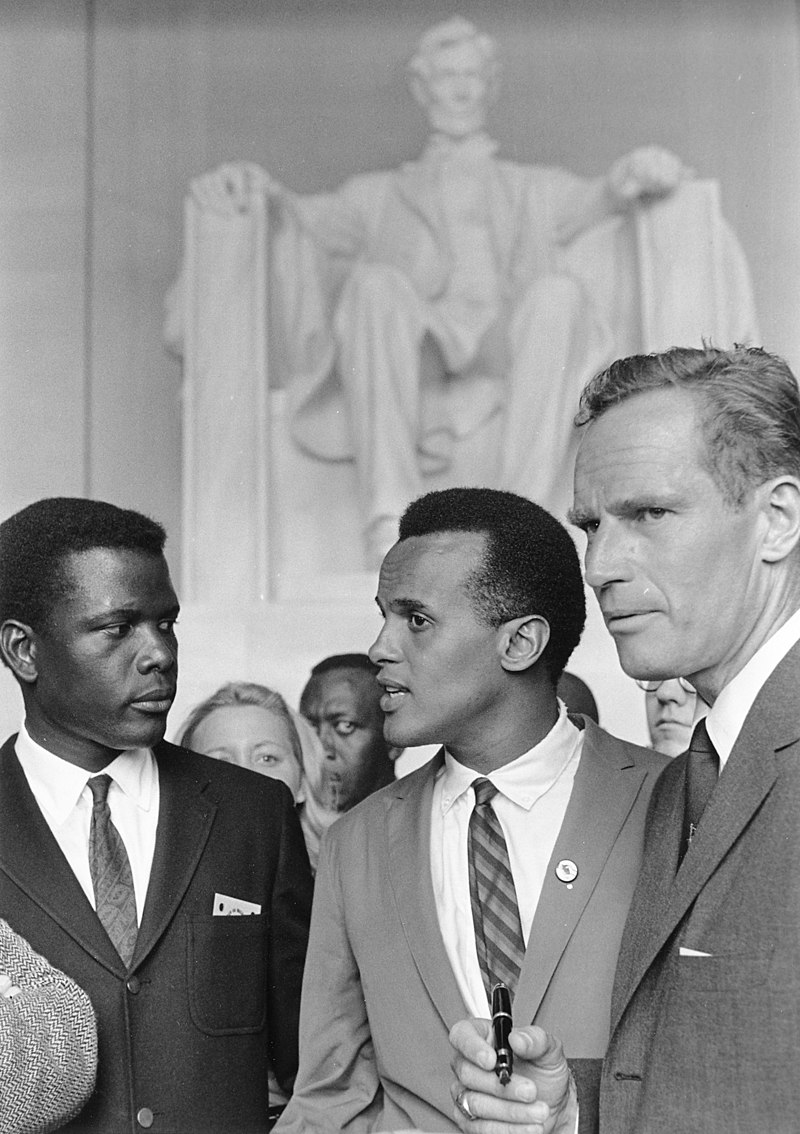 Belafonte (center) at the 1963 Civil Rights March on Washington, D.C., with Sidney Poitier (left) and Charlton Heston Belafonte supported the civil rights movement in the 1950s and 1960s and was one of Martin Luther King Jr.'s confidants.[78] He provided for King's family since King earned only $8,000 ($80,000 in today's time) a year as a preacher. As with many other civil rights activists, Belafonte was blacklisted during the McCarthy era. During the 1963 Birmingham campaign, Belafonte bailed King out of the Birmingham, Alabama jail and raised $50,000[79] to release other civil rights protesters. He contributed to the 1961 Freedom Rides, supported voter registration drives, and helped to organize the 1963 March on Washington.[28][80] He later recalled, "Paul Robeson had been my first great formative influence; you might say he gave me my backbone. Martin King was the second; he nourished my soul."[81] Throughout his career, Belafonte was an advocate for political and humanitarian causes, such as the Anti-Apartheid Movement and USA for Africa. From 1987 until his death, he was a UNICEF Goodwill Ambassador.[82] During the Mississippi Freedom Summer of 1964, Belafonte bankrolled the Student Nonviolent Coordinating Committee, flying to Mississippi that August with Sidney Poitier and $60,000 in cash and entertaining crowds in Greenwood. In 1968, Belafonte appeared on a Petula Clark primetime television special on NBC. In the middle of a duet of On the Path of Glory, Clark smiled and briefly touched Belafonte's arm,[83] which prompted complaints from Doyle Lott, the advertising manager of the show's sponsor, Plymouth Motors.[84] Lott wanted to retape the segment,[85] but Clark, who had ownership of the special, told NBC that the performance would be shown intact or she would not allow it to be aired at all. Newspapers reported the controversy,[86][87] Lott was relieved of his responsibilities,[88] and when the special aired, it attracted high ratings. Belafonte taped an appearance on an episode of The Smothers Brothers Comedy Hour to be aired on September 29, 1968, performing a controversial Mardi Gras number intercut with footage from the 1968 Democratic National Convention riots. CBS censors deleted the segment. The full unedited content was broadcast in 1993 as part of a complete Smothers Brothers Comedy Hour syndication package.[citation needed] Humanitarian activism Belafonte (left) with activist and opera star Stacey Robinson in 1988. In 1985, Belafonte helped organize the Grammy Award-winning song "We Are the World", a multi-artist effort to raise funds for Africa. He performed in the Live Aid concert that same year. In 1987, he received an appointment to UNICEF as a goodwill ambassador. Following his appointment, Belafonte traveled to Dakar, Senegal, where he served as chairman of the International Symposium of Artists and Intellectuals for African Children. He also helped to raise funds—along with more than 20 other artists—in the largest concert ever held in sub-Saharan Africa. In 1994, he embarked on a mission to Rwanda and launched a media campaign to raise awareness of the needs of Rwandan children.[21] In 2001, Belafonte visited South Africa to support the campaign against HIV/AIDS.[89] In 2002, Africare awarded him the Bishop John T. Walker Distinguished Humanitarian Service Award for his efforts.[45] In 2004, Belafonte traveled to Kenya to stress the importance of educating children in the region.[90] Belafonte had been involved in prostate cancer advocacy since 1996, when he was diagnosed and successfully treated for the disease.[91] On June 27, 2006, Belafonte received the BET Humanitarian Award at the 2006 BET Awards. He was named one of nine 2006 Impact Award recipients by AARP: The Magazine.[92] On October 19, 2007, Belafonte represented UNICEF on Norwegian television to support the annual telethon (TV Aksjonen) and helped raise a world record of $10 per Norwegian citizen.[93] Belafonte was also an ambassador for the Bahamas.[94] He sat on the board of directors of the Advancement Project.[95] He also served on the advisory council of the Nuclear Age Peace Foundation.[citation needed] Political activism Part of a series on Socialism in the United States History People Active organizations Inactive or defunct organizations Literature Related topics icon Socialism portal flag United States portal vte Belafonte was a longtime critic of U.S. foreign policy. He began making controversial political statements on the subject in the early 1980s. At various times, he made statements opposing the U.S. embargo on Cuba; praising Soviet peace initiatives; attacking the U.S. invasion of Grenada; praising the Abraham Lincoln Brigade; honoring Ethel and Julius Rosenberg; and praising Fidel Castro.[61][96] Belafonte is also known for his visit to Cuba that helped ensure hip-hop's place in Cuban society. According to Geoffrey Baker's article "Hip hop, Revolucion! Nationalizing Rap in Cuba", in 1999, Belafonte met with representatives of the rap community immediately before meeting with Castro. This meeting resulted in Castro's personal approval of, and hence the government's involvement in, the incorporation of rap into his country's culture.[97] In a 2003 interview, Belafonte reflected upon this meeting's influence:  Belafonte speaking at the 1963 March on Washington for Jobs and Freedom. "When I went back to Havana a couple years later, the people in the hip-hop community came to see me and we hung out for a bit. They thanked me profusely and I said, 'Why?' and they said, 'Because your little conversation with Fidel and the Minister of Culture on hip-hop led to there being a special division within the ministry and we've got our own studio.'."[98] Belafonte was active in the Anti-Apartheid Movement. In 1987, he was the master of ceremonies at a reception honoring African National Congress President Oliver Tambo at Roosevelt House, Hunter College, in New York City. The reception was held by the American Committee on Africa (ACOA) and The Africa Fund.[99] He was a board member of the TransAfrica Forum and the Institute for Policy Studies.[100] Opposition to the George W. Bush administration Belafonte achieved widespread attention for his political views in 2002 when he began making a series of comments about President George W. Bush, his administration and the Iraq War. During an interview with Ted Leitner for San Diego's 760 KFMB, on October 10, 2002, Belafonte referred to Malcolm X.[101] Belafonte said: There is an old saying, in the days of slavery. There were those slaves who lived on the plantation, and there were those slaves who lived in the house. You got the privilege of living in the house if you served the master, do exactly the way the master intended to have you serve him. That gave you privilege. Colin Powell is committed to come into the house of the master, as long as he would serve the master, according to the master's purpose. And when Colin Powell dares to suggest something other than what the master wants to hear, he will be turned back out to pasture. And you don't hear much from those who live in the pasture. Belafonte used the quotation to characterize former United States Secretaries of State Colin Powell and Condoleezza Rice. Powell and Rice both responded, with Powell calling the remarks "unfortunate"[101] and Rice saying, "I don't need Harry Belafonte to tell me what it means to be black."[102] 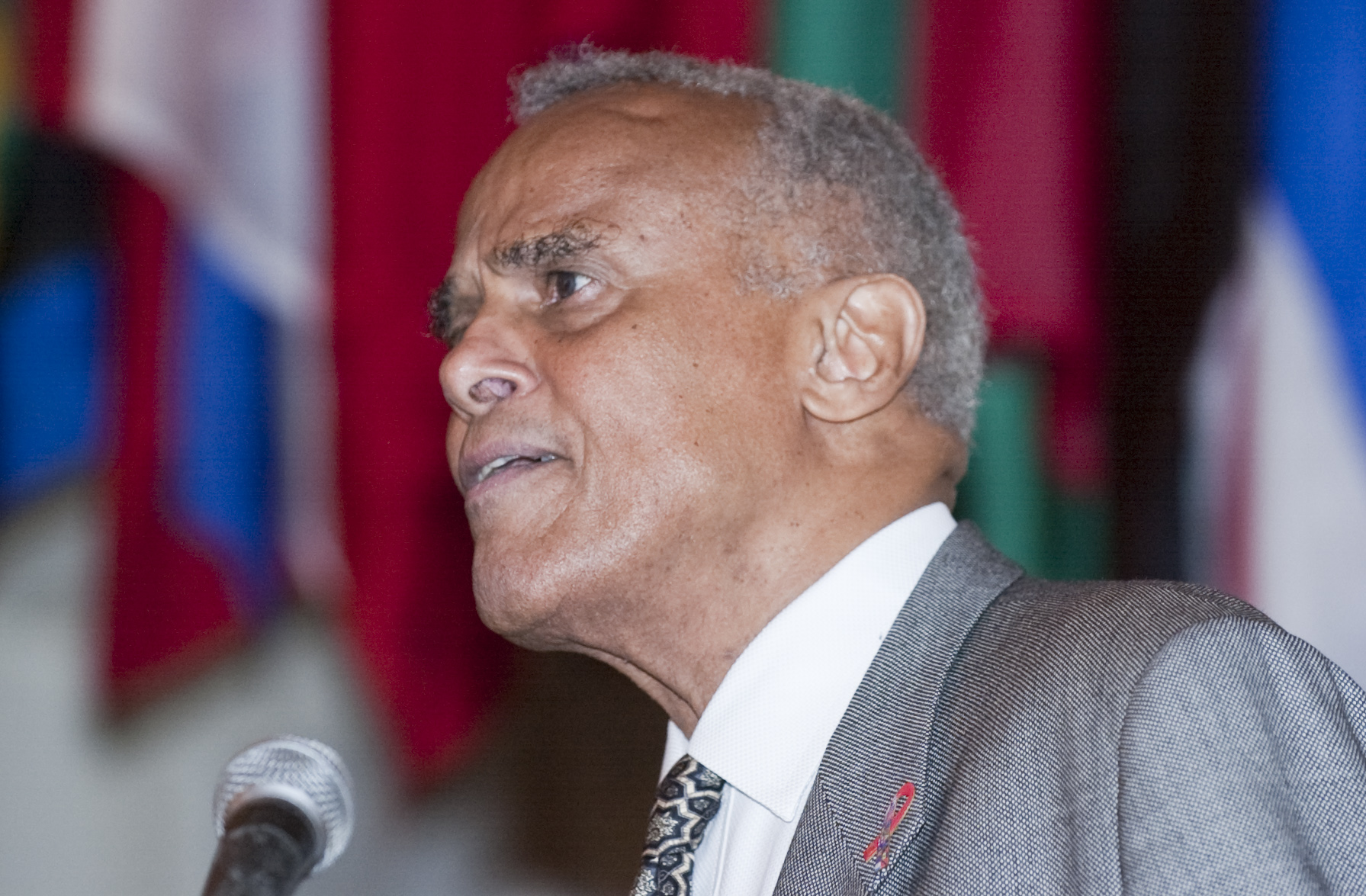 Belafonte in 2003 The comment resurfaced in an interview with Amy Goodman for Democracy Now! in 2006.[103] In January 2006, Belafonte led a delegation of activists including actor Danny Glover and activist/professor Cornel West to meet with Venezuelan president Hugo Chávez. In 2005, Chávez, an outspoken Bush critic, initiated a program to provide cheaper heating oil for poor people in several areas of the United States. Belafonte supported this initiative.[104] He was quoted as saying, during the meeting with Chávez, "No matter what the greatest tyrant in the world, the greatest terrorist in the world, George W. Bush says, we're here to tell you: Not hundreds, not thousands, but millions of the American people support your revolution."[105] Belafonte and Glover met again with Chávez in 2006.[106] The comment ignited a great deal of controversy. Hillary Clinton refused to acknowledge Belafonte's presence at an awards ceremony that featured both of them.[107] AARP, which had just named him one of its 10 Impact Award honorees 2006, released this statement following the remarks: "AARP does not condone the manner and tone which he has chosen and finds his comments completely unacceptable."[108] During a Martin Luther King Jr. Day speech at Duke University in 2006, Belafonte compared the American government to the hijackers of the September 11 attacks, saying, "What is the difference between that terrorist and other terrorists?" [109] In response to criticism about his remarks, Belafonte asked, "What do you call Bush when the war he put us in to date has killed almost as many Americans as died on 9/11 and the number of Americans wounded in war is almost triple? ... By most definitions Bush can be considered a terrorist." When he was asked about his expectation of criticism for his remarks on the war in Iraq, Belafonte responded, "Bring it on. Dissent is central to any democracy."[110] In another interview, Belafonte remarked that while his comments may have been "hasty", he felt that the Bush administration suffered from "arrogance wedded to ignorance" and its policies around the world were "morally bankrupt."[111] In a January 2006 speech to the annual meeting of the Arts Presenters Members Conference, Belafonte referred to "the new Gestapo of Homeland Security," saying, "You can be arrested and have no right to counsel!"[112] During a Martin Luther King Jr. Day speech at Duke University in Durham, North Carolina in January 2006, Belafonte said that if he could choose his epitaph, it would read "Harry Belafonte, Patriot."[113] In 2004, he was awarded the Domestic Human Rights Award in San Francisco by Global Exchange.[citation needed] Obama administration In the 1950s, Belafonte was a supporter of the African American Students Foundation, which gave a grant to Barack Obama Sr., the late father of 44th U.S. president Barack Obama, to study at the University of Hawaii in 1959.[114] In 2011, Belafonte commented on the Obama administration and the role that popular opinion played in shaping its policies. "I think [Obama] plays the game that he plays because he sees no threat from evidencing concerns for the poor."[115] On December 9, 2012, in an interview with Al Sharpton on MSNBC, Belafonte expressed dismay that many political leaders in the United States continue to oppose Obama's policies even after his reelection: "The only thing left for Barack Obama to do is to work like a third-world dictator and just put all of these guys in jail. You're violating the American desire."[116] On February 1, 2013, Belafonte received the NAACP's Spingarn Medal, and in the televised ceremony, he counted Constance L. Rice among those previous recipients of the award whom he regarded highly for speaking up "to remedy the ills of the nation."[117] New York City Pride Parade In 2013, Belafonte was named a grand marshal of the New York City Pride Parade alongside Edie Windsor and Earl Fowlkes.[118] Support for Bernie Sanders In 2016, Belafonte endorsed Vermont U.S. senator Bernie Sanders in the Democratic primaries, saying, "I think he represents opportunity, I think he represents a moral imperative, I think he represents a certain kind of truth that's not often evidenced in the course of politics."[119] Belafonte was an honorary cochairman of the Women's March on Washington, which took place on January 21, 2017, the day after the inauguration of Donald Trump as president.[120] The Sanders Institute Belafonte was a fellow at The Sanders Institute.[121] Business career Belafonte liked and often visited the Caribbean island of Bonaire.[122] He and Maurice Neme of Oranjestad, Aruba formed a joint venture to create a luxurious private community on Bonaire named Belnem, a portmanteau of the two men's names. Construction began on June 3, 1966.[123] The neighborhood is managed by the Bel-Nem Caribbean Development Corporation. Belafonte and Neme served as its first directors.[124] In 2017, Belnem was home to 717 people.[125] |
政治的・人道的活動 1966年、グスタフ6世アドルフ国王およびマーティン・ルーサー・キング・ジュニアとベラフォンテ。 ベラフォンテは政治とポップカルチャーを結婚させたと言われている[71]。ベラフォンテの政治的信条は、彼を指導した歌手、俳優、公民権運動家のポー ル・ロベソンから大きな影響を受けた[72]。ロベソンはアメリカにおける人種偏見だけでなく、アフリカにおける西洋の植民地主義にも反対した。ベラフォ ンテは1954年から1961年までアメリカ南部での公演を拒否した[73]。 1960年、ベラフォンテは民主党の大統領候補ジョン・F・ケネディのキャンペーンCMに出演した[74]。後にケネディはベラフォンテを平和部隊の文化 顧問に任命した。1964年のアメリカ大統領選挙では、ベラフォンテはリンドン・B・ジョンソンを支持した[75]。 2007年12月、ベラフォンテは北カリフォルニアACLUの「権利の日」記念式典で基調講演を行い、アール・ウォーレン市民自由賞(Chief Justice Earl Warren Civil Liberties Award)を受賞。2011年のサンダンス映画祭では、ドキュメンタリー映画『Sing Your Song』が上映された。この映画は、ベラフォンテのアメリカにおける公民権運動への貢献とリーダーシップ、そして世界的な社会正義の推進への努力に焦点 を当てた伝記映画である[76]。2011年、ベラフォンテの回顧録『My Song』がKnopf Booksから出版された[77]。 公民権運動への関与  シドニー・ポワチエ(左)、チャールトン・ヘストンと共に1963年の公民権ワシントン大行進に参加したベラフォンテ(中央)。 ベラフォンテは1950年代から1960年代にかけて公民権運動を支援し、マーティン・ルーサー・キング・ジュニアの側近の1人だった[78]。キング牧 師としてのキング牧師の年収はわずか8,000ドル(現在のレートで8万ドル)だったため、彼はキング牧師の家族を養った。他の多くの公民権運動家と同 様、ベラフォンテはマッカーシー時代にブラックリストに載った。1963年のバーミンガム・キャンペーン中、ベラフォンテはアラバマ州バーミンガムの刑務 所からキング牧師を保釈し、他の公民権運動家を釈放するために5万ドル[79]を集めた。彼は1961年のフリーダム・ライドに貢献し、有権者登録運動を 支援し、1963年のワシントン大行進の組織化に協力した[28][80]。マーティン・キングは2番目で、彼は私の魂に栄養を与えてくれた」[81]。 キャリアを通じて、ベラフォンテは反アパルトヘイト運動やUSAフォー・アフリカなどの政治的・人道的大義の提唱者であった。1987年から亡くなるま で、ユニセフ親善大使を務めた[82]。 1964年のミシシッピ・フリーダム・サマーでは、ベラフォンテは学生非暴力調整委員会(Student Nonviolent Coordinating Committee)の資金源となり、同年8月にはシドニー・ポワチエ(Sidney Poitier)と6万ドルの現金とともにミシシッピに飛び、グリーンウッドで群衆を楽しませた。1968年、ベラフォンテはNBCのペトゥラ・クラーク のゴールデンタイムのテレビ特番に出演した。オン・ザ・パス・オブ・グローリー』のデュエットの途中で、クラークは微笑みながら短くベラフォンテの腕に触 れたが[83]、これに対して番組のスポンサーであるプリムス・モーターズの広告マネージャー、ドイル・ロットから苦情が出た[84]。ロットはその部分 を録画し直したかったが[85]、特番の所有権を持つクラークはNBCに、パフォーマンスをそのまま見せるか、まったく放送しないかのどちらかだと言っ た。新聞はこの論争を報じ[86][87]、ロットは責任を解かれ[88]、特番が放送されると高視聴率を獲得した。 ベラフォンテは1968年9月29日に放送される『The Smothers Brothers Comedy Hour』のエピソードに出演し、1968年の民主党全国大会の暴動の映像を挟んで物議を醸すマルディグラのナンバーを披露するために録音した。CBSの 検閲官はこの部分を削除した。編集されていない完全な内容は、1993年にSmothers Brothers Comedy Hourのシンジケーションパッケージの一部として放送された。 人道主義活動 1988年、ベラフォンテ(左)と活動家でオペラスターのステイシー・ロビンソン。 1985年、ベラフォンテはグラミー賞受賞曲「We Are the World」の企画を手伝った。同年、ライブ・エイド・コンサートに出演。1987年、ユニセフの親善大使に任命される。任命後、ベラフォンテはセネガル のダカールを訪れ、「アフリカの子どもたちのための芸術家と知識人の国際シンポジウム」の議長を務めた。また、サハラ以南のアフリカで開催された史上最大 のコンサートで、20人以上のアーティストとともに資金集めに貢献した。1994年にはルワンダへのミッションに乗り出し、ルワンダの子どもたちのニーズ に対する認識を高めるためのメディア・キャンペーンを開始した[21]。 2001年、ベラフォンテはHIV/AIDS撲滅キャンペーンを支援するため南アフリカを訪れた[89]。2002年、アフリケアは彼の努力に対し、ビ ショップ・ジョン・T・ウォーカー特別人道奉仕賞を授与した[45]。2004年、ベラフォンテはケニアを訪れ、同地域の子供たちの教育の重要性を訴えた [90]。 2006年6月27日、ベラフォンテは2006年BETアワードでBETヒューマニタリアン賞を受賞。AARPによる2006年インパクト賞受賞者9人の うちの1人に選ばれた[92]: 2007年10月19日、ベラフォンテはユニセフの代表としてノルウェーのテレビ番組に出演し、毎年恒例のテレソン(TV Aksjonen)を支援した。 ベラフォンテは長年にわたり米国の外交政策を批判してきた。1980年代初頭から、この問題に関して物議を醸す政治的発言を始めた。様々な時期に、彼はア メリカのキューバ禁輸に反対する声明を出し、ソ連の平和構想を賞賛し、アメリカのグレナダ侵攻を攻撃し、エイブラハム・リンカーン旅団を賞賛し、エセル・ ローゼンバーグとジュリアス・ローゼンバーグを称え、フィデル・カストロを賞賛した[61][96]。ベラフォンテはまた、キューバ社会におけるヒップ ホップの地位を確かなものにしたキューバ訪問でも知られている。ジェフリー・ベイカーの論文「Hip hop, Revolucion!キューバにおけるラップの国有化 "によると、1999年、ベラフォンテはカストロとの会談の直前にラップ・コミュニティの代表者と会った。この会合の結果、カストロはラップを自国の文化 に取り入れることを個人的に承認し、それゆえ政府も関与することになった[97]。2003年のインタビューで、ベラフォンテはこの会合の影響について振 り返っている:  1963年の「雇用と自由のためのワシントン大行進」で演説するベラフォンテ。 「数年後にハバナに戻ったとき、ヒップホップ・コミュニティの人たちが私に会いに来てくれて、少し一緒に過ごした。彼らは私に深く感謝し、私は "なぜ?"と言うと、彼らは "ヒップホップに関するフィデルと文化大臣とのちょっとした会話が、省内に特別な部署を作ることにつながり、私たちは自分たちのスタジオを手に入れたから だ "と言った」[98]。 ベラフォンテは反アパルトヘイト運動に積極的に参加した。1987年、彼はニューヨークのハンター・カレッジにあるルーズベルト・ハウスで開催されたアフ リカ民族会議オリバー・タンボ議長を讃えるレセプションで式典の司会を務めた。このレセプションはACOA(American Committee on Africa)とアフリカ基金によって開催された[99]。 ジョージ・W・ブッシュ政権への反対 ベラフォンテは2002年、ジョージ・W・ブッシュ大統領とその政権、イラク戦争について一連の発言を始めたことで、その政治的見解が広く注目されるよう になった。2002年10月10日、サンディエゴの760KFMBのテッド・ライトナーとのインタビューで、ベラフォンテはマルコムXについて言及した [101]: 奴隷制度の時代には、古いことわざがある。農園に住む奴隷と、家に住む奴隷がいた。主人に仕え、主人の意図したとおりに仕えれば、その家に住む特権を得る ことができた。それが特権を与えたのだ コリン・パウエルは、主人の目的に従って主人に仕える限り、主人の家に入ることを約束した。そして、コリン・パウエルがあえて主人の望むこと以外のことを 提案すると、彼は放牧地に追い返される。そして、牧草地に住んでいる人たちからあまり話を聞くことはない。 ベラフォンテはこの引用を使って、コリン・パウエルとコンドリーザ・ライスの元国務長官を評した。パウエルとライスはこれに対し、パウエルはこの発言を 「残念だ」と言い[101]、ライスは「黒人であることの意味をハリー・ベラフォンテに教えてもらう必要はない」と言った[102]。  2003年のベラフォンテ 2006年1月、ベラフォンテは俳優のダニー・グローヴァーや活動家/教授のコーネル・ウェストを含む活動家の代表団を率いて、ベネズエラのウゴ・チャベ ス大統領と会談した[103]。2005年、露骨なブッシュ批判者であるチャベスは、米国のいくつかの地域で貧しい人々に安価な暖房油を提供するプログラ ムを開始した。ベラフォンテはこのイニシアチブを支持した[104]。彼はチャベスとの会談で、「世界最大の暴君、世界最大のテロリストであるジョージ・ W・ブッシュが何を言おうとも、我々はここにいる: 何百人、何千人ではなく、何百万人ものアメリカ国民があなたの革命を支持しているのです」[105] ベラフォンテとグローヴァーは2006年にチャベスと再会した。ヒラリー・クリントンは、二人が登場した授賞式でベラフォンテの存在を認めることを拒否し た[107]。AARPは、2006年のインパクト・アワードの受賞者10人に彼を選んだばかりだったが、この発言を受けて次のような声明を発表した。 2006年にデューク大学で行われたマーティン・ルーサー・キング・ジュニア・デーのスピーチで、ベラフォンテはアメリカ政府を9.11同時多発テロのハ イジャック犯になぞらえ、"あのテロリストと他のテロリストの違いは何だ?"と言った。[109]この発言に対する批判に対してベラフォンテは、「ブッ シュが今日まで我々を陥れた戦争で、9.11の死者とほぼ同数のアメリカ人が殺され、戦争で負傷したアメリカ人の数はほぼ3倍になっているのに、ブッシュ を何と呼ぶのか?... たいていの定義では、ブッシュはテロリストとみなされる" イラク戦争に関する発言に対する批判が予想されるとの質問に対し、ベラフォンテはこう答えた。異論は民主主義の中心だ」[110]。 別のインタヴューでベラフォンテは、自分の発言は「性急」だったかもしれないが、ブッシュ政権は「無知と結びついた傲慢さ」に苦しんでおり、世界中の政策 は「道徳的に破綻している」と感じていると述べた[111]。 「2006年1月、アーツ・プレゼンター・メンバーズ・カンファレンスの年次総会でのスピーチで、ベラフォンテは「国土安全保障省の新しいゲシュタポ」に 言及し、「逮捕されても弁護を受ける権利はない!」と述べた[112]。2006年1月、ノースカロライナ州ダーラムのデューク大学で行われたマーティ ン・ルーサー・キング・ジュニア・デーのスピーチで、ベラフォンテは、もし自分の墓碑銘を選べるなら、「ハリー・ベラフォンテ、愛国者」と読むだろうと 語った[113]。 2004年、彼はサンフランシスコでグローバル・エクスチェンジから国内人権賞を受賞した[要出典]。 オバマ政権 1950年代、ベラフォンテはアフリカ系アメリカ人学生財団の支援者であり、同財団は1959年に第44代アメリカ大統領バラク・オバマの父親であるバラ ク・オバマ・シニアがハワイ大学で学ぶための助成金を与えた[114]。 2011年、ベラフォンテはオバマ政権と、その政策形成において民意が果たした役割についてコメントした。「オバマは)貧しい人々への懸念を表明すること に脅威を感じないからこそ、あのような駆け引きをするのだと思う」[115]。 2012年12月9日、MSNBCのアル・シャープトンとのインタビューで、ベラフォンテは、米国の多くの政治指導者が再選後もオバマの政策に反対し続け ていることに落胆を表明した: 「バラク・オバマに残された唯一のことは、第三世界の独裁者のように働いて、この連中を全員刑務所に入れることだ。あなたはアメリカの願望を侵害してい る」[116]。 2013年2月1日、ベラフォンテはNAACPのスピンガーン・メダルを受賞し、テレビ放映された授賞式で、「国家の悪を改善するために」発言したことを 高く評価するコンスタンス・L・ライスを、過去の受賞者のひとりに数えた[117]。 ニューヨーク・プライド・パレード 2013年、ベラフォンテはイーディ・ウィンザー、アール・フォウルクスとともにニューヨーク・シティ・プライド・パレードのグランドマーシャルに任命さ れた[118]。 バーニー・サンダース支持 2016年、ベラフォンテは民主党予備選でバーモント州選出の上院議員バーニー・サンダースを支持し、「彼は機会を象徴し、道徳的要請を象徴し、政治の過 程ではあまり証明されないある種の真実を象徴していると思う」と述べた[119]。 ベラフォンテは、ドナルド・トランプの大統領就任式の翌日、2017年1月21日に行われた「ワシントンへの女性の行進」の名誉共同議長を務めた [120]。 サンダース研究所 ベラフォンテはサンダース研究所のフェローだった[121]。 ビジネスキャリア ベラフォンテはカリブ海のボネール島が好きで、よく訪れていた[122]。 アルバのオラニエスタッドに住むモーリス・ネメとジョイント・ベンチャーを組み、ボネール島に2人の名前の合成語であるベルネムと名付けた豪華なプライ ベート・コミュニティを建設。建設は1966年6月3日に始まった[123]。この地域はベルネム・カリビアン・ディベロップメント・コーポレーションに よって管理されている。ベラフォンテとネメはその初代取締役を務めた[124]。 2017年、ベルネムには717人が住んでいた[125]。 |
Personal life, health and death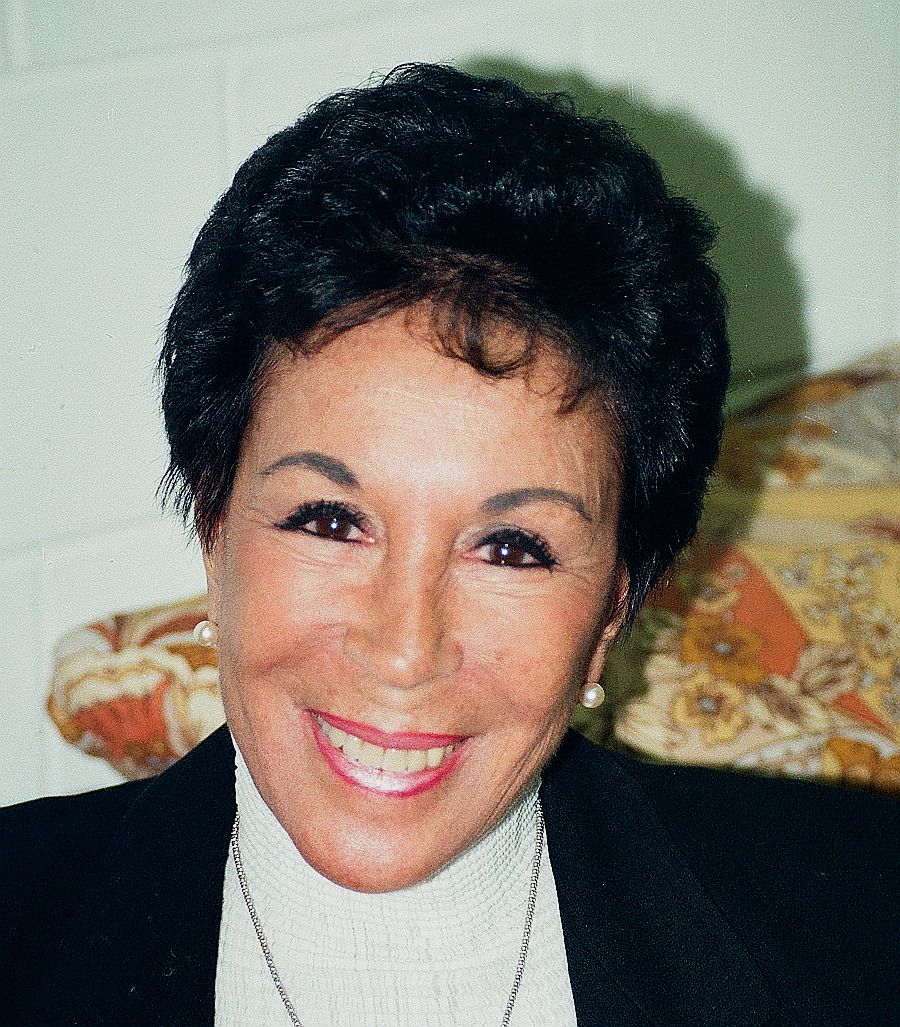 Second wife Julie Robinson in 1998 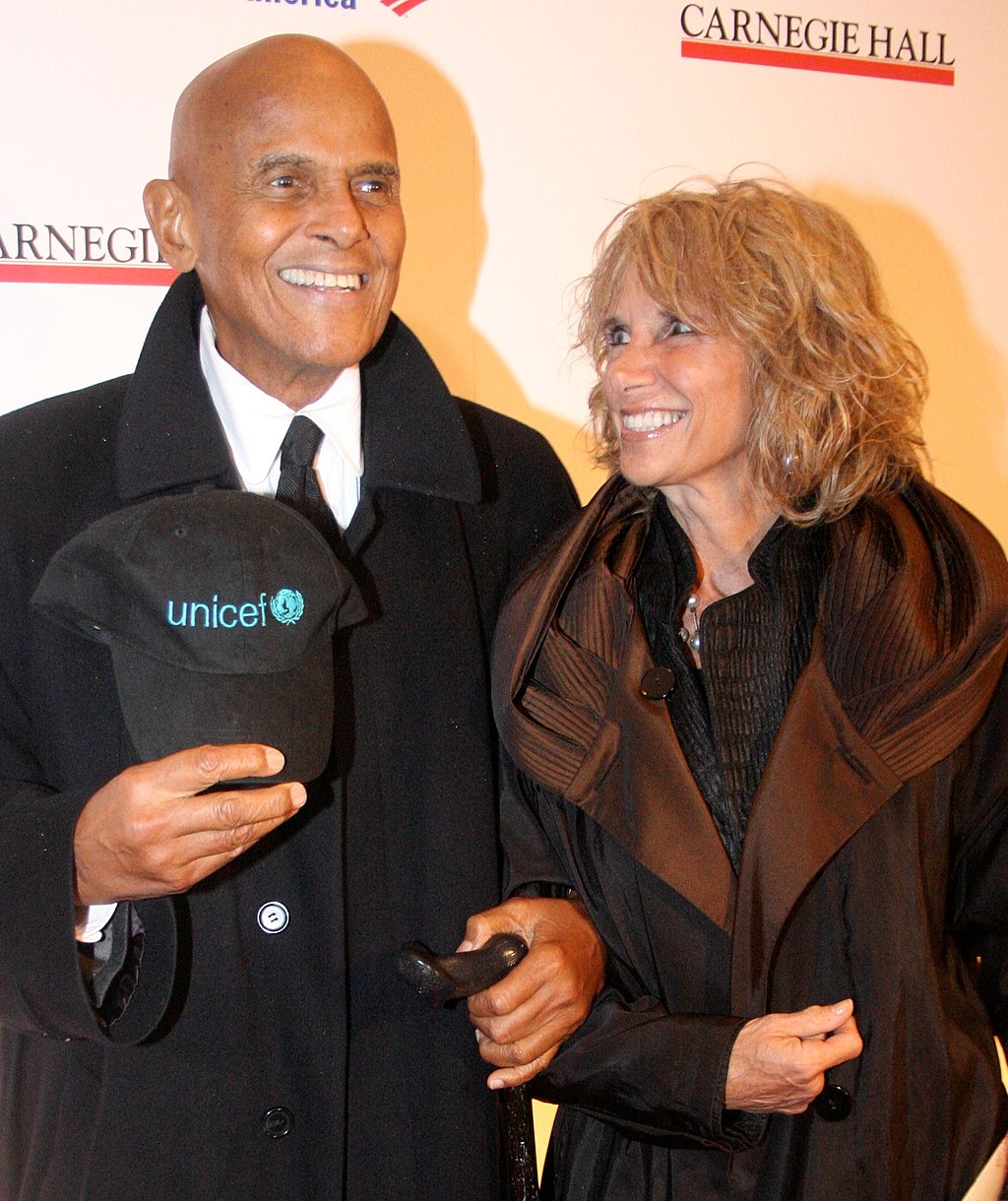 Belafonte with third wife Pamela Frank in April 2011 Belafonte and Marguerite Byrd were married from 1948 to 1957. They had two daughters: Adrienne and Shari. They separated when Byrd was pregnant with Shari.[71] Adrienne and her daughter Rachel Blue founded the Anir Foundation/Experience, focused on humanitarian work in southern Africa.[126] In 1953, Belafonte was financially able to move from Washington Heights, Manhattan "into a white neighborhood in East Elmhurst, Queens."[127] Belafonte had an affair with actress Joan Collins during the filming of Island in the Sun.[128] On March 8, 1957, Belafonte married his second wife Julie Robinson, a former dancer with the Katherine Dunham Company who was of Jewish descent. They had two children: Gina and David.[129] After 47 years of marriage,[130] Belafonte and Robinson divorced in 2004. In Fall 1958, Belafonte was looking for an apartment to rent on the Upper West Side. After he had been turned away from other apartment buildings due to being black, he had his white publicist rent an apartment at 300 West End Avenue for him. When he moved in, and the owner realized that he was an African American, he was asked to leave. Belafonte not only refused, but he also used three dummy real estate companies to buy the building and converted it into a co-op, inviting his friends, both white and black, to buy apartments. He lived in the 21-room, 6-bedroom apartment for 48 years.[131] In April 2008, he married Pamela Frank, a photographer.[132] 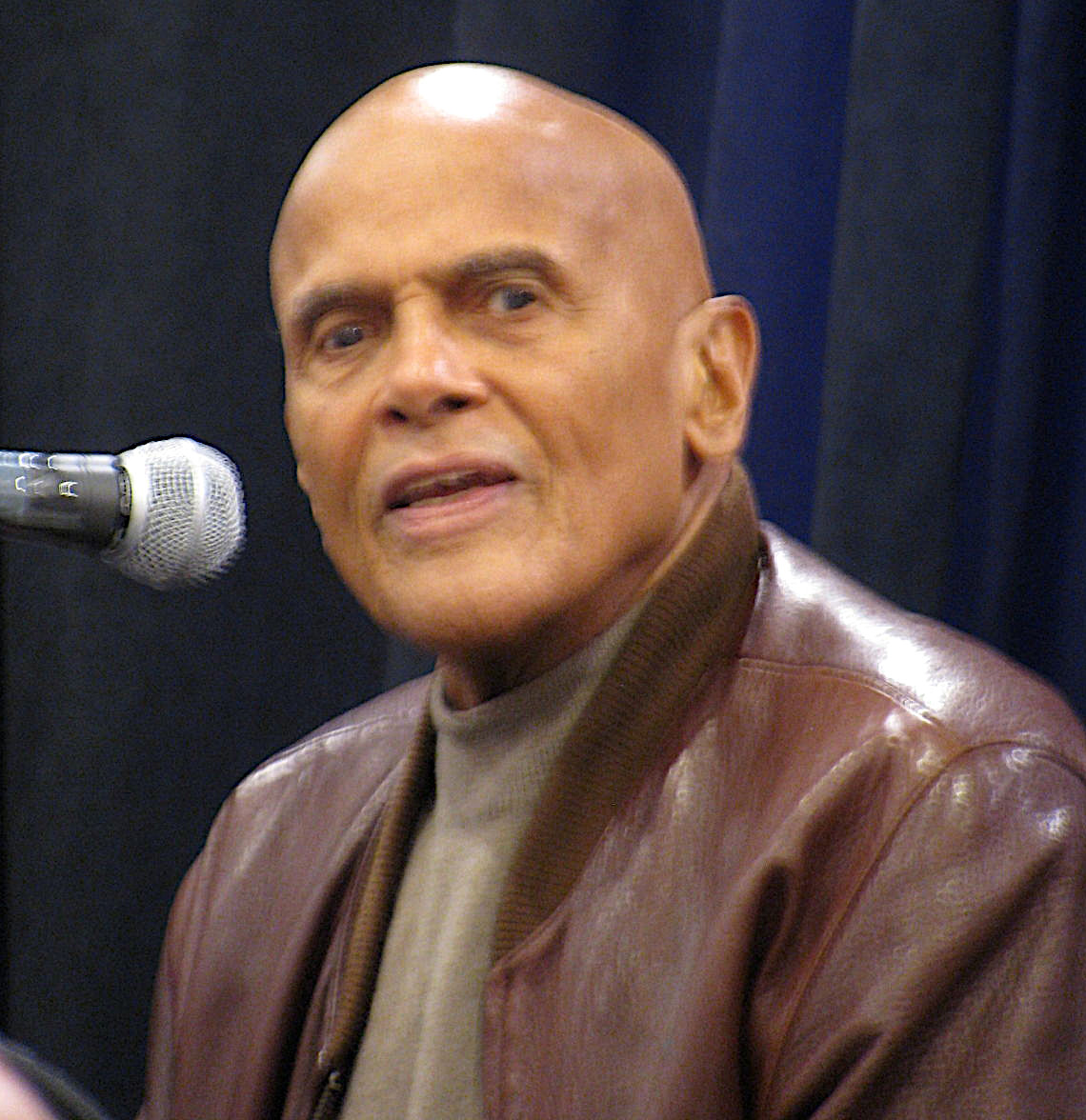 Belafonte in 2013 Belafonte had five grandchildren: Rachel and Brian through his children with Marguerite Byrd, and Maria, Sarafina and Amadeus through his children with Robinson. He had two great-grandchildren by his oldest grandson Brian. In October 1998, Belafonte contributed a letter to Liv Ullmann's book Letter to My Grandchild.[133] In 1996, Belafonte was diagnosed with prostate cancer and was treated for the disease. He suffered a stroke in 2004, which took away his inner-ear balance. From 2019, Belafonte's health began to decline, but he remained an active and prominent figure in the civil rights movement.[citation needed] Belafonte died from congestive heart failure at his home on the Upper West Side of Manhattan, New York City on April 25, 2023, at the age of 96.[10] |
私生活、健康、死 1998年、2番目の妻ジュリー・ロビンソン  2011年4月、ベラフォンテと3番目の妻パメラ・フランク ベラフォンテとマルグリット・バードは1948年から1957年まで結婚していた。ふたりにはふたりの娘がいた: アドリアンとシャリー。アドリアンと娘のレイチェル・ブルーは、アフリカ南部での人道的活動に焦点を当てたアニール財団/エクスペリエンスを設立した [126]。 1953年、ベラフォンテはマンハッタンのワシントン・ハイツから「クイーンズ区イースト・エルムハーストの白人居住区に引っ越す」経済的余裕を得た [127]。 ベラフォンテは『アイランド・イン・ザ・サン』の撮影中に女優のジョーン・コリンズと不倫関係にあった[128]。 1957年3月8日、ベラフォンテはキャサリン・ダンハム・カンパニーの元ダンサーでユダヤ系の2番目の妻ジュリー・ロビンソンと結婚。ふたりにはふたり の子供がいた: 47年間の結婚生活の後、[130]ベラフォンテとロビンソンは2004年に離婚した。 1958年秋、ベラフォンテはアッパー・ウエスト・サイドで賃貸アパートを探していた。黒人であることを理由に他のアパートから追い返された後、彼は白人 の広報担当者にウェスト・エンド・アヴェニュー300番地のアパートを借りてもらった。彼が入居し、オーナーが彼がアフリカ系アメリカ人であることを知る と、出て行くよう求められた。ベラフォンテは拒否しただけでなく、ダミーの不動産会社3社を使ってビルを買い取り、白人、黒人を問わず友人を招いてアパー トを購入させ、コーポに改造した。2008年4月、彼は写真家のパメラ・フランクと結婚した[132]。  2013年のベラフォンテ ベラフォンテには5人の孫がいた: マルグリット・バードとの間にもうけたレイチェルとブライアン、ロビンソンとの間にもうけたマリア、サラフィナ、アマデウスである。一番上の孫ブライアン との間には2人のひ孫がいた。1998年10月、ベラフォンテはリヴ・ウルマンの著書『Letter to My Grandchild』に手紙を寄稿した[133]。 1996年、ベラフォンテは前立腺がんと診断され、治療を受けた。2004年に脳卒中を患い、内耳のバランスを失った。2019年以降、ベラフォンテの健 康は衰え始めたが、公民権運動では活発で著名な人物であり続けた[要出典]。 ベラフォンテは2023年4月25日、ニューヨーク・マンハッタンのアッパー・ウエスト・サイドにある自宅でうっ血性心不全により96歳で死去した [10]。 |
| Harry Belafonte discography | |
| Accolades and legacy Belafonte is an EGOT honoree, having received three Grammy Awards, an Emmy Award,[3] a Tony Award,[178] and, in 2014, the Jean Hersholt Humanitarian Award at the Academy of Motion Picture Arts and Sciences' 6th Annual Governors Awards.[179] He also received various honours including the Kennedy Center Honors in 1989, the National Medal of Arts in 1994 and was inducted into the Rock and Roll Hall of Fame in the Early Influence category in 2022.[5] Belafonte celebrated his 93rd birthday on March 1, 2020, at Harlem's Apollo Theater in a tribute event that concluded "with a thunderous audience singalong" with rapper Doug E. Fresh to 1956's "Banana Boat Song". Soon after, the New York Public Library's Schomburg Center for Research in Black Culture announced it had acquired Belafonte's vast personal archive of "photographs, recordings, films, letters, artwork, clipping albums," and other content.[182] https://en.wikipedia.org/wiki/Harry_Belafonte |
称賛と遺産 ベラフォンテはグラミー賞を3回、エミー賞を1回[3]、トニー賞を1回[178]、そして2014年には映画芸術科学アカデミーの第6回ガバナーズ・ア ワードでジーン・ハーショルト・ヒューマニタリアン賞を受賞しており、EGOTの栄誉に輝いている[179]。 また、1989年にはケネディ・センター栄誉賞、1994年には国民芸術勲章を受賞し、2022年にはロックの殿堂の初期影響部門に殿堂入りした[5]。 ベラフォンテは2020年3月1日、ハーレムのアポロ・シアターで93歳の誕生日を祝い、ラッパーのダグ・E・フレッシュとともに1956年の「バナナ・ ボート・ソング」を歌い、「けたたましい観客のシンガロングで」締めくくった。その直後、ニューヨーク公共図書館のションバーグ・センター・フォー・リ サーチ・イン・ブラック・カルチャーは、ベラフォンテの「写真、録音、映画、手紙、アートワーク、切り抜きアルバム」などの膨大な個人アーカイブを取得し たと発表した[182]。 |
| 「俳優としてのハリー・ベラフォンテ」エミリオ・エステヴェス監督の映
画『ボビー』で、老いに悩むホテルの元ドアマンを演じた。ちなみに、この作品で重要な意味合いを持つキング牧師、ロバート・ケネディとは個人的にも親交が
あった。 |
『ボビー』(Bobby)は、
2006年のアメリカ映画。ボビーの愛称で親しまれたロバート・F・ケネディが暗殺された日に、事件が起こったアンバサダーホテルに居合わせた人々を描い
た群像劇。出演俳優は豪華な顔ぶれとなっている。監督は俳優としても活躍しているエミリオ・エステベス。 第63回ヴェネツィア国際映画祭のコンペティション部門に出品され、トロント国際映画祭でも上映された。第64回ゴールデングローブ賞では作品賞とオリジ ナル歌曲賞で候補になった。主題歌となる「Never Gonna Break My Faith」はブライアン・アダムス他が作詞・作曲を手掛け、アレサ・フランクリンとメアリー・J・ブライジが歌う豪華な顔合わせとなっている(なお、予 告編で使われているのはブライアン・アダムスが歌うバージョンである[3])。 |
| 日本での受容 ハリー・ベラフォンテ(Harry Belafonte、1927年3月1日 - 2023年4月25日)は、アメリカ合衆国の歌手、俳優、社会活動家。「バナナ・ボート」などのヒット曲やアフリカ支援のチャリティソング「ウィ・アー・ ザ・ワールド」の制作にも携わる[1]。「USAフォー・アフリカ」の提唱者として知られる。 ニューヨーク市ハーレム生まれ。父親は仏領マルティニーク系黒人、母はジャマイカ系である。1956年に「バナナ・ボート」が世界的な大ヒットとなり、ア ルバム『カリプソ』も当時としては珍しいミリオンセラーを記録し、一躍スターとなった[2]。 「バナナ・ボート」はジャマイカの労働者がバナナを船に積み込むときに歌う労働歌を元に作られた曲で、"Day-o, Day-ay-ay-o ・・・ Day, me say day, me say day, me say day Me say day, me say day-ay-ay-o・・・"。という掛け声が特徴的。この掛け声の語感のコミカルさから、日本でも浜村美智子や江利チエミのカバーバージョンがヒット した。またその後も「マティルダ」や「ダニー・ボーイ」などの世界的なヒット曲を連発した。 ベラフォンテのコンサートを観た三島由紀夫は、「ベラフォンテがどんなにすばらしかは、舞台を見なければ、本当のところはわからない。ここには熱帯の太陽 があり、カリブ海の貿易風があり、ドレイたちの悲痛な歴史があり、力と陽気さと同時に繊細さと悲哀があり、素朴な人間の魂のありのままの表示がある。そし て舞台の上のベラフォンテは、まさしく太陽のやうにかがやいてゐる。(中略)歌はれる歌には、リフレインが多い。全編ほとんどリフレインといふやうな歌が ある。これは民謡的特色だが、同時に呪術的特色でもある。わづかなバリエーションを伴ひながら『夏はもうあらかた過ぎた』(ダーン・レイド・アラウンド) とか『夜ごと日の沈むとき』(スザンヌ)とかいふ詩句が、彼の甘いしはがれた声で、何度となくくりかへされると、われわれは、ベラフォンテの特色である、 暗い粘つこい叙情の中へ、だんだんにひき入れられる。声が褐色の幅広いリボンのやうにひらめく。われわれは、もうその声のほかには、世界中に何も聞かない のである。(中略)(私は)『バナナ・ボート』や、たのしい『ラ・バンバ』をことに愛する」[3]と、その歌声を絶賛した。 2023年4月25日、うっ血性心不全のため、マンハッタン・アッパーウエストサイドにある自宅にて死去、96歳没[2][4]。 https://x.gd/ERLP8 |
『ボビー』(Bobby)ストーリー 1968年6月5日、ロサンゼルスのアンバサダーホテルでは民主党の大統領候補指名選キャンペーン中の上院議員ロバート・ケネディを迎える準備が進められ ていた。 ロビーでは長年ドアマンを務めた後に引退したジョンが友人のネルソンとチェスに興じている。 厨房ではアフリカ系のシェフ・エドワードを中心に、メキシコ人のホセとミゲルらが人種差別に不満を抱きながらも真面目に働いている。 厨房のマネージャであるティモンズは人種差別的な態度で支配人エヴァースからクビを言い渡される。 そのエヴァースは電話交換係のアンジェラと不倫関係にあったが別れる。しかし、不倫の事実をティモンズに知られてしまう。 エヴァースの妻ミリアムが美容師として働くホテル内の美容院にダイアンという若い女性が客としてやって来る。 彼女は今夜ホテルで結婚式を挙げるが、相手のウィリアムは恋人ではなく、彼が徴兵でベトナムに送られることを避けるための偽装結婚だった。 ホテルのショーに出演している歌手ヴァージニアは夫でマネージャーのティムとホテルに滞在している。人気にかげりが見え、酒に溺れている彼女にティムは手 を焼いている。 そこに彼女のエージェントのフィルが次の仕事を持って来る。 ホテルのコーヒーショップでは女優志望のスーザンがウェイトレスとして働いている。 彼女と親しい大学生のジミーとクーパーは、選挙キャンペーンにボランティアで参加しつつも、それを怠けてヤクの売人フィッシャーからLSDをもらって、 フィッシャーの部屋で羽目を外す。 選挙キャンペーンに多大な寄付をしている裕福なソーシャライトである熟年夫婦ジャックとサマンサは一見幸せそうに見えるが、夫ジャックには鬱病を患った過 去があり、妻サマンサも情緒不安定な状態にある。 選挙キャンペーンを取り仕切るウェイドとアフリカ系のスタッフであるドウェインは予備選の祝勝会の準備を進めていた。そんなウェイドにチェコスロバキアか らやって来た女性記者レンカ・ヤナチェックはケネディにインタビューさせてくれと強く迫る。何度断っても諦めない彼女にウェイドはわずかの時間ならとイン タビューを許可する。 祝勝会が始まる。将来の大臣候補として紹介され、壇上に立ったドウェインに、同じくアフリカ系の電話交換係であるパトリシアは惹かれ、2人の間には恋の予 感が芽生える。ケネディの演説が始まり、その場にいた者たちは彼の言葉に耳を傾ける。演説が終わり、会場を出る近道として厨房を通る途中にケネディは暗殺 者によって撃たれてしまう。そして、その場に居合わせたウィリアム、ジミー、クーパー、サマンサ、ティモンズが流れ弾に当たって大怪我を負う。彼らは一命 を取り留めたものの、ケネディは翌朝病院で亡くなる。 映画の中でケネディを演じる役者の顔は一切映らず、代わりに当時のケネディの実写映像が使われている。 |
| Harry
Belafonte - Sing Your Song (2011), a biographical documentary on the
life and times of singer, actor, and activist Harry Belafonte. Directed
by Susanne Rostock. |
|
| https://en.wikipedia.org/wiki/Harry_Belafonte |
|
| Sharlet, Jeff (2013). "Voice and Hammer". Virginia Quarterly Review (Fall 2013): 24–41. Retrieved October 4, 2013. Smith, Judith. Becoming Belafonte: Black Artist, Public Radical. University of Texas Press, 2014. ISBN 9780292729148. Wise, James. Stars in Blue: Movie Actors in America's Sea Services. Annapolis, MD: Naval Institute Press, 1997. ISBN 1557509379. OCLC 36824724. |
Sharlet, Jeff (2013). 「声とハンマー」. Virginia Quarterly Review (Fall 2013): 24-41. 2013年10月4日取得。 Smith, Judith. Becoming Belafonte: Black Artist, Public Radical. University of Texas Press, 2014. ISBN 9780292729148. Wise, James. Stars in Blue: Stars in Blue: Movie Actors in America's Sea Services. Annapolis, MD: Naval Institute Press, 1997. ISBN 1557509379. OCLC 36824724. |
リ ンク
文 献
そ の他の情報

Copyleft, CC, Mitzub'ixi Quq Chi'j, 1996-2099
☆ ☆
☆